#but really I would like to see more conclusive stories that still show the consequential aftershock
Note
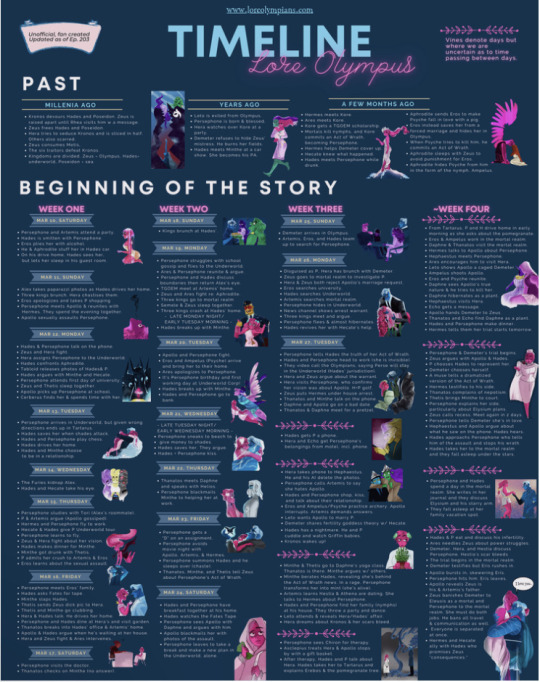
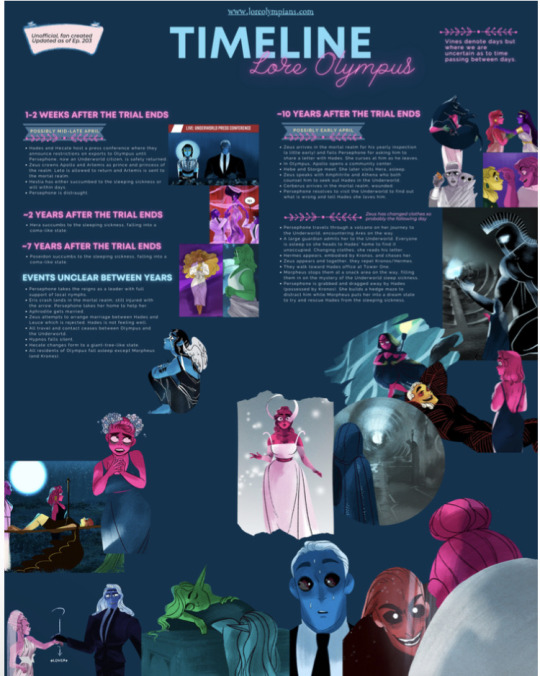
The confirm timeline makes everything  and makes Demeter a lot more sympathetic to see her daughter do something so stupid 
oh man seeing the confirmed timeline back when it was still being updated thru S2 was when the cracks started to form for me because I couldn't fucking BELIEVE the first season took place over the course of a week. It's weird because on the one hand it tries to imply that time has passed (like with Persephone's grades slipping) but on the other it keeps writing the story event to event, often consequentially (as in, Event C happens because of Event B, which happens because of Event A) so like, the conclusions these timelines come to are pretty simple in and of themselves - these events often all happen in one day and couldn't have been separated by weeks.
For example, on March 15th, Persephone reveals to Eros that she was SA'd. She stays the night at his place so she can have a safe space away from home where Apollo often comes and goes. That's something that would reasonably lead into March 16th's events which are also all pretty condensed because it's when Minthe slaps Hades which happens the day after she stands him up. And then Hades ends up at Hera's place where Persephone also shows up for inexplicably no reason. Of course, Hades and Persephone both aren't home at this time, so it makes for the perfect opportunity for Thanatos to break in to both her room and Hades' office. And that turns into the Hades and Apollo argument after Hades drives Persephone home.
So there's no way the order of these events are being 'mistaken' for a shorter timeline, because every event interlinks so seamlessly. It undoubtedly works for people reading week to week when there's real life time passing in between each episode to give you the illusion of time passing in the comic, but when you really take these events and lay them out end to end in their most sensible order, it's ridiculous how little time has passed. It's why I laugh when people tell me LO is "better binged", like no it fucking isn't, it's worse because when you binge it, you realize just how little time is passing and how much Rachel covers every minute detail of every hour of every day.
A more recent example? Hades and Persephone are already engaged 4 days after Persephone said she wanted to take it slow.
Don't believe me? Hold on tight, because this is about to get dicey.
Day 1 (Ep 207-208) - Hades and Persephone are tended to by their friends/relatives following the battle with Kronos. Persephone has her punishment lifted by Zeus, Zeus and Hades make up. P x H have their "taking it slow" conversation and decide to be boyfriend/girlfriend. As Persephone curls up in bed with Hades, she feels like she's "forgetting something" (i.e. Demeter).
Day 2 (Ep 209-214) - Hades wakes up from a nightmare, which includes hints as to what happened to Thanatos while Hades was being possessed, leading into the start of the next day with Persephone comforting him. They get to work "fixing" the Underworld by doing a Steven Universe dance. During this time, Demeter is looking for her daughter and finds out from Artemis she's in the Underworld, so she decides to go find her. We get the flashback sequence showing Demeter's backstory with Hades and why she was never made Queen of the Mortal Realm. Meanwhile, Hades and Persephone are checking out "Elysium" (which just seems to be a few trees and a river in the Underworld lmao) and start splashing around in the river. Demeter intervenes right as they're returning from their outdoor excursion, still dripping with river water. Persephone and Demeter reunite while Hades talks to the dog but it's a short-lived conversation as she refuses to go back to the Mortal Realm with Demeter claiming she "seems to still be in love". Persephone sends Demeter on her way, who's spotted by Minthe and a few other nymphs. Minthe claims she "has something to do" and walks off, with the heavy implication she's about to approach Demeter. This leads into the Minthe flashbacks depicting her backstory with her own mother and showing what happened to her after her plant curse was lifted. The day she tried to get back to the Underworld, she finds a lost child who she returns to nymph preschool, where Minthe ends up getting a job as a substitute. Right after that, she's summoned to a conversation with Persephone, who reveals to her that the realms are cut off and she's been a plant for three years. Back in present day, Minthe ends up in a conversation with Thetis (who's now married and the mother of a baby Achilles) where she effectively tells Thetis to fuck off. Minthe continues forward, making it to her real destination, which is her job teaching nymphs life skills like making a resume (effectively making the Demeter cliffhanger pointless clickbait).
Day 3 (Ep 214-223) - Hades is preparing breakfast (literally a single donut) for Persephone, during which he thinks back to the conversation with Demeter where Demeter asked Hades how he could let her make the deal with Erebus (this goes nowhere). Hades insists Persephone should take the day off. Hades meets with Hecate, revealing to her that he's ashamed his realm is in such bad shape for Persephone. Hades wants to speak with Kronos, but Hecate convinces Hades it would be a bad idea to go down today. Instead, they opt to speculate on how he could have returned, and decide the only person who would know what happened is Hypnos.
Thus begins the most pointless fetch quest in all of LO *deep breath*:
Hades and Hecate have no idea where to find Hypnos, so they decide to go seek his brother Thanatos for help, but Thanatos doesn't want to talk to Hades because Hades treated him like shit and fired him; despite this, Daphne lets Hades in anyways where Hades and Than have a shitty 'make up' conversation that solves nothing between them; we also get flashbacks of what happened between Than and Daphne during the time skip; Hades finally asks Than where they can find Hypnos; they pick up boba tea for Daphne and then drop her off; Thanatos guides Hades to Hypnos' location which was under his nose the entire time, in the HR department of the Underworld Corp; they find Hypnos, who reveals how Kronos was able to take advantage of his powers; Hecate takes Morpheus under her wing as an apprentice of sorts; Hypnos reveals that Kronos has taken a child captive; despite saying they weren't going to talk to Kronos today, Hades and Hecate head down to Tartarus to speak to Kronos, but they can't access it because Kronos has the doors locked and won't open them for anyone but "his Golden Traitor" (implying Hera). This whole fetch quest ends up being useless btw when we find out later that Kronos has been able to talk to Hera the entire time.
*heavy breathing*
Anyways, while all this is going on, Persephone is in Olympus, enjoying her day off, when she's intercepted by Daphne (remember, she had been dropped off by Hades/Hecate/Than!) who's met up with Eros; Persephone reveals she and Hades haven't "done it yet", Eros reveals that he's married with kids now and has to run off to tend to them; Daphne and Persephone leave the restaurant, where they spot a presidential campaign ad featuring Apollo; Persephone and Daphne go to the bank where Persephone runs into her old classmate Tori and acts like a huge Karen to him just because he gossiped about her once 10 years ago; she finds out through Tori (as he works at the bank) that she has an account that's accrued a shitload of money which allows her to buy an apartment that same day, we KNOW it's the same day because it cuts to Hades who's thinking about everything that went down and wondering how he's gonna tell Persephone; he meets her at her new apartment where they proceed to have Chinese (???) takeout. Hades talks a little about how things went but doesn't go into detail, he doesn't tell her about the child deity. We suddenly transition to Persephone at Hades' house where Persphone's packing up her things to take to her new apartment. They end up having the sex conversation, spurred on by Eros/Daphne questioning her about it earlier. Ares shows up that night drunk and looking for Persephone. Hades goes out to comfort him while Persephone stays behind in the bedroom. It's revealed that Aphrodite has left Ares. Hades finds Persephone in his personal theater, where they proceed to watch a movie from 1920's post-WWI Germany and it's heavily implied they have sex during this (*they do not). Ares texts Aphrodite, who's in bed with Hephaestus.
Day 4 (Ep 224 onwards) - The next day starts with Aphrodite/Ares/Heph flashbacks revealing why Aphrodite left Ares, and with a "first meeting" between Heph and Aphrodite. Back to present day, Aphrodite blocks Ares on her phone and meets up with Psyche for coffee. Persephone and Hades are getting ready to leave for work when they find a note left by Ares, which we later find out is urging Persephone to meet up with him to talk about her fertility goddess powers. More Heph / Aphrodite flashbacks. Hades finally mentions the child deity to Persephone. Hera shows up at Hades' work where they proceed to info dump the Kronos/child deity stuff on her. Persephone gets jealous of Hades calling her 'Bunny'. Hera wants to plan Persephone's coronation. Persephone decides she'll be the one to talk to Demeter about her coronation. Hera leaves, this is where it's revealed Kronos has been living in her head for an undisclosed amount of time. Psyche and Hephaestus speak in private, where Psyche reveals she's stolen a pen drive off Apollo for Hephaestus to investigate. Kassandra is revealed. We get some Psyche flashbacks showing how Psyche became a goddess for the purpose of spying on Apollo on Zeus' behalf. Heph gets Psyche to track down Kassandra through Eros/Aphrodite. Cut back to Hades, who's on his own (while Persephone is spending her first night at her new apartment) and is trying to create an engagement ring for Persephone, while reminiscing on their conversation the night before about "the hegemony of virginity". He's summoned by Persephone, who immediately bursts into tears about how upset she is that she got jealous of Hera (not that Hades called her Bunny lmao). This happens in the same day because Persephone says "I got jealous today." More TherapySpeak where Hades makes it all about him. Persephone reveals she's going to meet up with Ares, so Hades decides to accompany her in moth form. Persephone goes to the Mortal Realm to meet with Ares where, according to him, it's "after evening" (w/e the fuck that is, it doesn't look like night time though). This meeting is also counting as her obligatory "date" with him. Ares shows her an old temple with statues in it depicting the fertility goddesses. Ares is barely able to give her any extra info on it that Hades couldn't have already told her. Persephone touches the depiction of Metis and is immediately Avatar'd into the nth dimension where she meets with Metis. Metis tells her about Gaia and how fertility goddesses are a part of the Ouranos lineage. Persephone wakes up from her Avatar state (it's actually visibly night at this point) to find Ares has ditched her. Hades reminds her that she had a visit with Demeter already planned and shouldn't forget it. Demeter sabotages their visit with the whole TGOEM purity club intervention, during which she cages Hades. Hestia lets Hades free, and he immediately proposes to Persephone. Hades takes her away to the Underworld.
WOW that was a lot. But my god, I do not blame the creators of that timeline in the slightest for calling it quits (from the looks of it, they haven't updated it since Season 2). It's absolutely insane how crazy the timeline is. I'm almost half-tempted to finish what these folks started, especially if they stopped due to some kind of divine intervention from Rachel (tinfoil hat theory, but it wouldn't be the first time Rachel's sabotaged a fan project).
This only covers the Free episodes of course, but SPOILER Hades and Persephone end up having to get married literally the next day due to an embargo Demeter's placed on them under the rules of xenia (according to Zeus).
So. Yeah. They've been officially together for 4 days and got married on the 5th.
Peak romance fiction, y'all. They totally got back at the haters who said they were rushing shit.
134 notes
·
View notes
Text
I do want more stories where like...a character just goes fucking berserk without remorse or consequence and just ends the Big Problem the world has to face.
I want to see the consequences of that and hear about the beginnings of the after effects of that towards something better even though the main character created so much destruction and collateral damage in their wake
I also want stories where a character goes fucking berserk but is precise, calculative, and cautious and careful but will still end the Big Fucking Problem that plagues everyone.
I want to, again, see the consequences of that and hear about the beginnings of the after effects of that towards something better even though the main character created so much destruction and collateral damage even though they were meaningful, precise, compassionate, and thoughtful, and killed and destroyed exactly what needed to be killed and destroyed by any fucking means necessary after their cautionary strategy
I'm so fucking tired of having the Big Problem being named again and again and again and again and again, and WE DON'T GET TO THE POINT WHERE THAT PROBLEM FACES ITS FUCKING CONSEQUENCES THEY JUST CONTINUE TO EXIST I FUCKING HATE THAT GIVE ME FUCKING CLOSURE ALREADY
#It might be escapism talking and basic story functionality taking over my goddamn brain#but really I would like to see more conclusive stories that still show the consequential aftershock#of when a Big Problem gets destroyed/killed/obliterated#I'm tired of distracting the characters so much to the degree that the big problem doesn't get considered#even in a fucking cliffhanger ending#where that Big Problem/entity/evil/corporation/government institution doesn't face a single bit of backlash of the hell#that that entity brought upon the world the character is in#I feel like there's less and less stories where we see an alternative#even at the cost of what it takes to get rid of that big problem#and it's just more about 'LOL THE PROBLEM IS STILL THERE SO DEAL WITH IT BITCHES' and like...#that can make for a good story but for me it's seriously overfuckingdone#throw caution to the fucking wind and make the godlike characters you placed to face these problems actually solve them#and still have both compelling answers and questions afterward#while still having the big problem GONE#OPEN MORE FUCKING PANDORA BOXES FFS#BECAUSE MAYBE JUST MAYBE THAT GLIMMER OF HOPE IN THE BOX AFTER ALL CALAMITY IS OUT OF THE BOX#IS THE ALTERNATIVE PEOPLE NEED TO FUCKIING SEE#THAT THE BIG EVILS THAT WE CREATE AREN'T FOREVER#*sigh*...
3 notes
·
View notes
Text
Lesson 52 analysis + 53 predictions
Turning this into a routine thing now! They’re fun to write and they’re popular (moreso than my actual commentary posts lmao).
Y’all like my ramblings.
Things guessed correctly from prior lesson
The House of Lamentation was an illusion produced by the fairies
The arc culminated in the completion of the Trial of Patience (star received via Simeon)
The illusion did a number on Simeon's feelings as well due to his fondness for Lucifer and the brothers
They shoved Mammon and Luke off to the side and plopped them back in only after the Satan/Simeon arc was complete. There was no arc for Luke. To be fair, though, they did get more content than I expected even so.
Things guessed wrong
The banshee didn't show up at all. It was a red herring.
There was no significance to the geranium found in the mysterious book
Our adventure also completed the Trial of Generosity. (I incorrectly attributed this to Diavolo, who actually gave us the Star of Gratitude)
Still ???
Whether or not there is some kind of transfer of memories/experiences going on between the brothers' past selves and present selves due to our meddling in time. We've confirmed that past angel Beelzebub has turned into a glutton in between the time we last saw him and now, but we haven't confirmed if it *is* our meddling that has induced that. Currently, no change has manifested in the present brothers, nor has the timeline of events seemed to have significantly changed.
Whether or not present Lucifer becoming more "angelic" in season 2, in lieu of past angel Lucifer's growing doubt, will be a significant plot point. The parallels are getting stronger, though. (This is elaborated on further down)
It feels like 50/50? I’ll probably keep a list like this going for future analysis/prediction posts just so I can keep track of how right/mistaken I am throughout the playthrough. Might help me make less mistakes in my analysis!
As a general rule I try not to meander too far off into symbolism or out-of-game lore because what I write begins to sound like this:
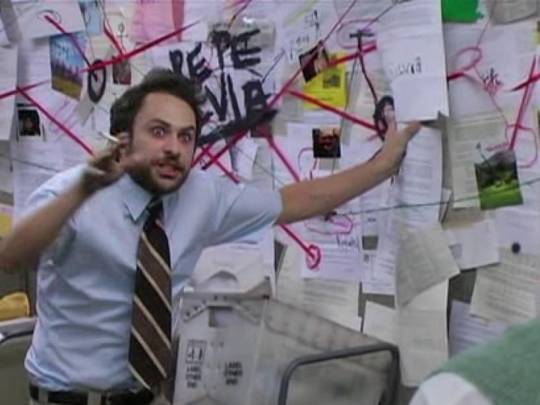
And this is an otome game that is light on writing and plot. Nine times out of ten, it’s not going to be that deep. So I work with the details given and the plot points shown and try to draw connections within the framework of the story, in an attempt to try to deduce where the devs are taking the plot. Unfortunately for me, the devs like red herrings, and red herrings are designed to mislead you. With me, they are quite successful! I’d like to get better at spotting them.
The book was consequential -- it’s used to imprison Satan later -- but that’s the end of it’s meaning. Maybe the Bible verse had something to do with it, too -- those were some weird ass numbers to just throw in the title -- but maybe not. Either way, it doesn’t really matter.
But enough of that, onwards! We have a lot of points to go over that may be interesting to note, right or not.
Satan the Memory Thief
Back in 50-B we learn that it was Michael who taught the brothers the stories behind the human world constellations.
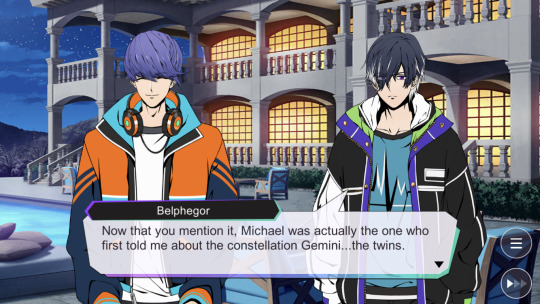
When we’re tossed back in time-dreamland (?) again, it is Satan who takes the opportunity to teach the brothers the human world constellations. The room had just been remodeled: Michael hasn’t had the opportunity to give them tours yet. Lucifer mosied into the room so he and the brothers can get the first glimpse.
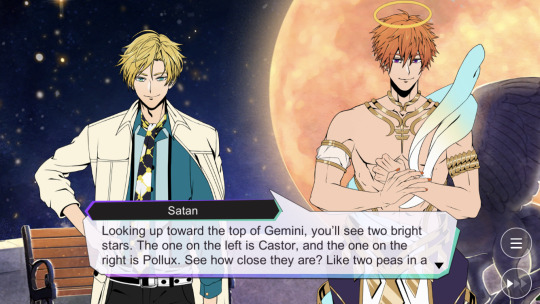
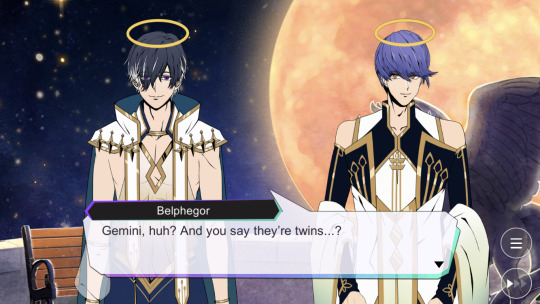
Sooo if in a future lesson we ask them about where they learned the constellations in the present timeline and they say “oh a guy named Sully, who suspiciously looked just like Satan, taught us!” then we know our meddling is having significant consequences.
It IS worth noting that unlike the prior dream sequence, Satan and Simeon remember what they just went through. This particular time-dream could very well just be an illusion meant to give Satan/Simeon some kind of emotional resolution and nothing else. This is kind of why I hate that they’re bring time travel back into the story: it makes stuff like this confusing and borderline inconsistent. Some sequences may have effects and others may not.
The chat between Lucifer and Simeon could also be consequential.
“Do you *really* mean that?”
There is a parallel at play here!
After you wake up after dozing off, you go off to find Lucifer and Simeon conversing in a forest clearing, evidently unaware that you’re eavesdropping on them. Simeon says although he knows it is just an illusion, that he was glad to see angel Lucy once more. Angel Lucy is predictably confused, and reassures Simeon that they’ll remain like this forever.

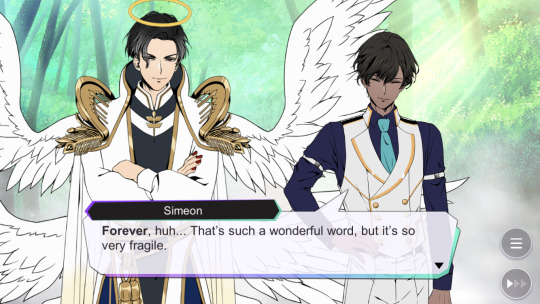

Simeon, of course, knows better. He tells Lucifer that he knows he’s been meeting with Diavolo and he’s having doubts about his place in the Celestial Realm -- and if things really will remain the same. Lucy is caught off guard, and starts to explain with some clear hesitation... and of course we pass out before we could hear his answer.
There’s creepy loud heartbeats when it fades out. Normally I associate them with tense, pivotal decisions -- but it could also just be related to us waking up and returning to reality.
If Simeon ends up being wrong -- and there will be real world consequences to this conversation -- they could be very significant consequences. We’re not sure if the conversation continues for a bit longer after we pass out, but Simeon already woke up before we come to.
Obviously the brothers still fell (they’re still demons in the present), but I wouldn’t underestimate the potential of a butterfly effect changing the circumstances of the Great Celestial War. I kind of hope they don’t do that, though, because they haven’t even begun to explain the present details of that event. We know only the broad strokes. Suddenly changing them to make the resolution between the demons and angels more smooth will feel really forced.
And that parallel I mentioned: Diavolo expresses similar worries and doubt in Lucifer’s conviction in season 2.
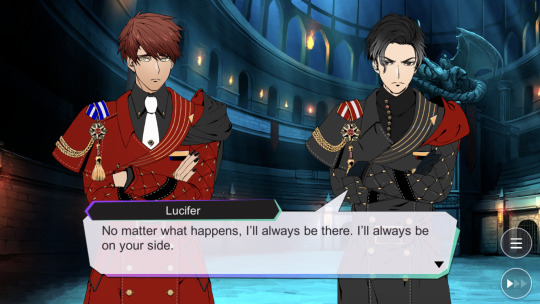
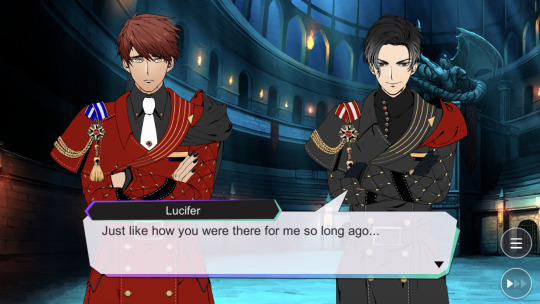
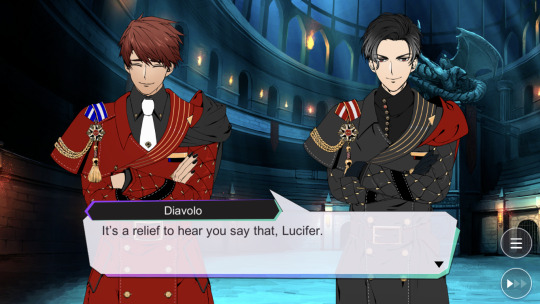
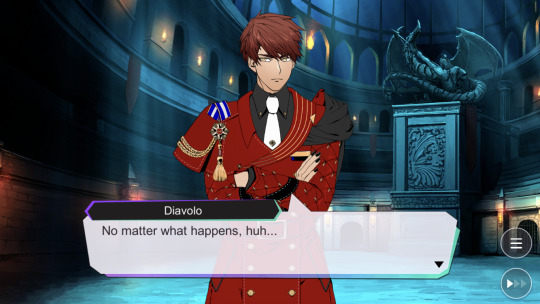
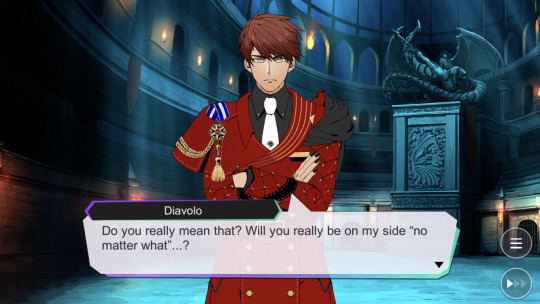
I have no doubt Lucifer actually means what he says to Diavolo, unlike his dialogue with Simeon, but Diavolo is aware of just how far Lucifer will go for the sake of his family -- and he’s probably #2 on the priority list, when push comes to shove. Lucifer forsaking the Celestial Realm for Lilith was the thing that brought him to Diavolo in the first place.
Of course, this lesson has Simeon suggesting that Diavolo’s influence on Lucifer was significant prior to all that unfolding, and it may have eventually happened regardless. It was only a matter of when, not how.
Still, Lucifer be writing checks he may not be able to cash. We also get this foreboding warning from Barbatos in Season 2:
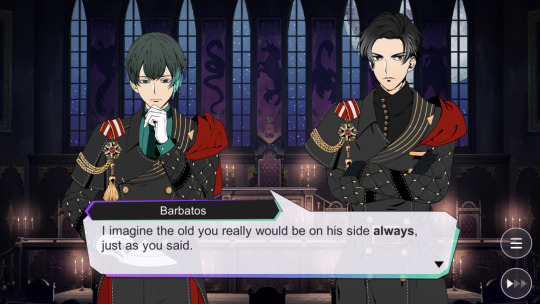

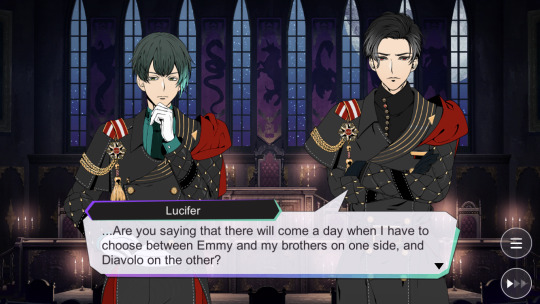
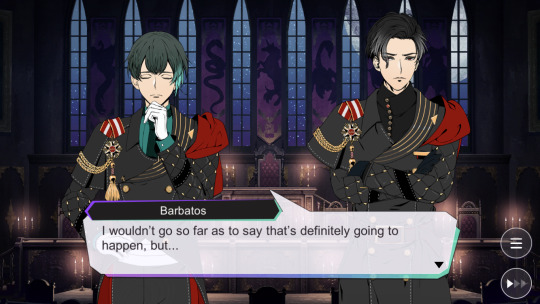


As I’ve said before, the inevitable conflict the story was hinting to at this point doesn’t happen in Season 2. Lucifer isn’t forced to make a choice like this. The Night Dagger didn’t demand it.
I’ve also expressed my belief that Season 2 and Season 3 were likely written back-to-back due to the small window of time between their releases, so I believe details overlooked in Season 2 may suddenly become more relevant in Season 3.
It’s worth remembering Diavolo’s growing feelings for MC -- and Lucifer’s inner conflict about it -- were hinted at early in Season 2, as well. It doesn’t really get going until the conclusion of Season 2, leading into Season 3.
Do I have any clue of what this is actually leading up to? Not at all! If it mirrors Season 2′s format, though, it’ll suddenly come to a head in the last 3-5 lessons. I remember feeling equally clueless then, and Season 2 had a lot more foreshadowing...
... a lot of which actually didn’t pan out! But it might now.
Guardian Angels
Another smaller, but interesting detail. Guardian Angels are indeed a thing.


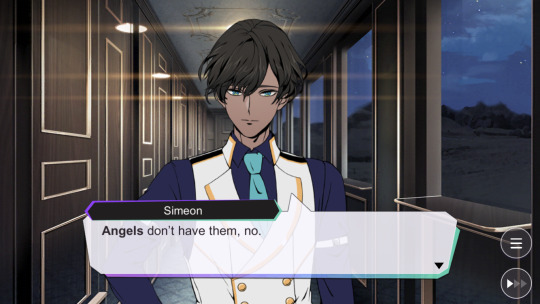
I think they’re gonna become a thing soon. The devs very sneakily changed a small detail in Season 2, suggesting they might have realized that it may interfere with their plans for later seasons.
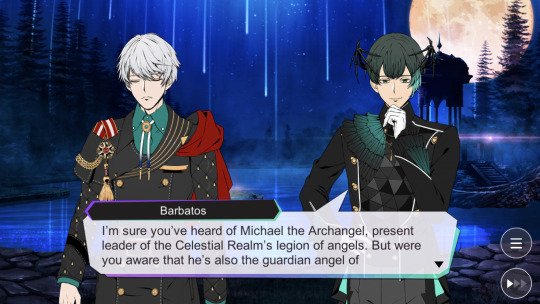
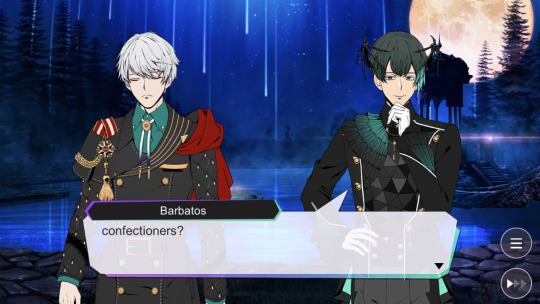
Old version.
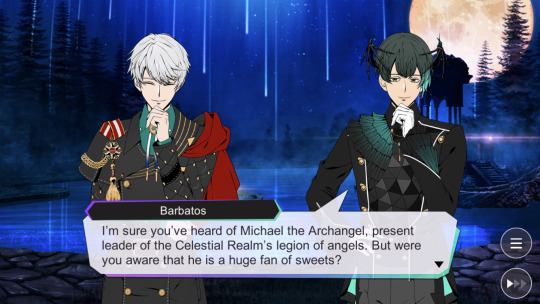
New version.
I’m thinking they may have decided giving Michael guardianship of an entire swath of the population was cheating, and they may be individualizing the role of Guardian Angels.
Which leads me to who I think Michael’s chosen human squeeze is:
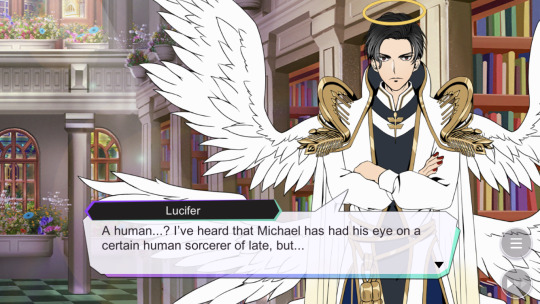
My man has been scoping him out long before we came around.
It makes sense, too. We know Michael gave his Ring of Wisdom to Solomon, which seems to have kickstarted his career as a demon-pacting sorcerer (though he clearly was a sorcerer before this).
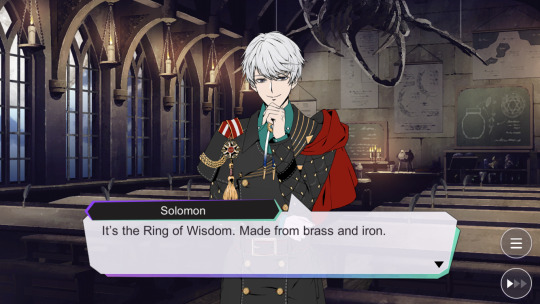


This is a very powerful item, described as the Ring of Light’s counterpart, that would be very useful for a high-ranking angel to possess. I don’t think Michael would fork it over to just anyone, particularly when we remember how he felt compelled to interrogate us via dream hi-jack before the Ring of Light fully came into our possession.
Solomon also makes Michael angst in a way a well-meaning but misbehaving child would make their parent angst:


Solomon also really doesn’t seem to regard Michael like some distant, all-powerful alien being who could smite him out of existence.
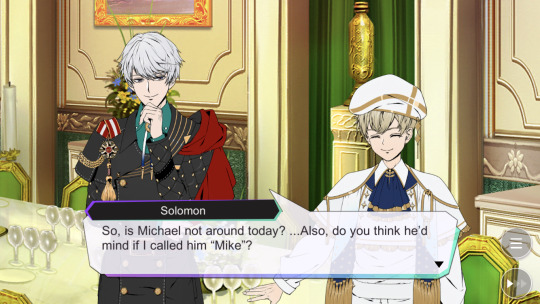
Contrast this with how he responds when he’s forced to hang out with Diavolo for a day (he gets more comfortable, but he initially wants to punt the responsibility back to Lucifer ASAP).
And he knows a surprising amount of small details about the guy:
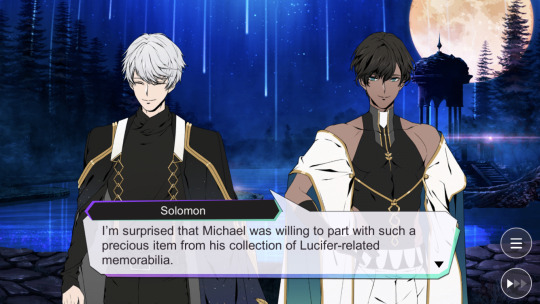
I think Solomon is a significant part of Michael’s long-term plans, but he may not even be fully aware of how. Or he is, and they’re in some kind of mutually beneficial agreement -- possibly related to cross-realm peace -- that we simply haven’t been made aware of yet.
Personally, I think Simeon should be made MC’s ‘official’ Guardian Angel if they’re gonna be a thing with official mechanics behind them. I know Michael is supposed to be the Big Cheese and ridiculously hot, so it may make sense to have him linked to the MC of an otome game because they’re super special too, but Michael may already have Solomon. He shouldn’t get to hog everything. It’s not like assigning Simeon to do job would really inconvenience him, either: MC is Solomon’s apprentice. He can easily work with the arrangement.
Luke may feel left out but he’s a kid so...
Seven Brothers Constellation
We learn there’s a constellation representing the brothers in the Celestial Realm. Everyone there knows the legend, but Luke doesn’t know what the three stars ‘watching over them’ represent.
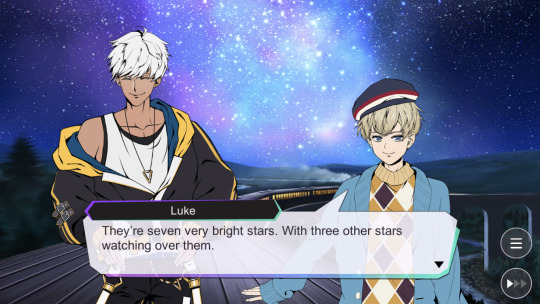
He, Mammon, and Satan begin to theorize and Satan suggests they may represent the three realms. The other two like the idea, and Mammon insists the ‘human’ star represents MC.
He’s probably right, but I’m willing to take it a step further: it represents MC, Diavolo, and Michael. The three “guardians” of their respective realms, and the brothers. Season 3 has been repeatedly beating us over the head with how much Michael still cares for the brothers and his relevance to their upbringing, and likely their future.
It bears repeating: Diavolo and Michael are aiming towards the same goal, though their visions of what peace and harmony looks like may be very different.

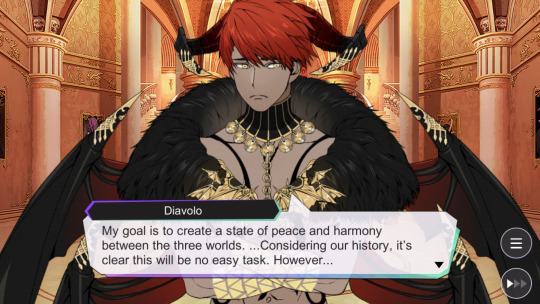
Solomon could also qualify as a self-appointed guardian, but I think he lacks the connection to the brothers MC obviously has.
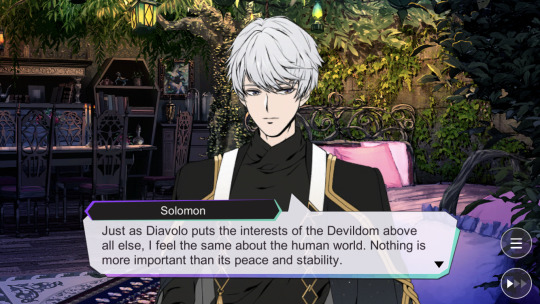
Still, he has the same resolve, and he’s not leaving the story any time soon.
Predictions
I sniff out even the smallest Michael details because he’s clearly the key to whatever is gonna blow up.
This might give us some insight on how the initial dealings with him may unfold:
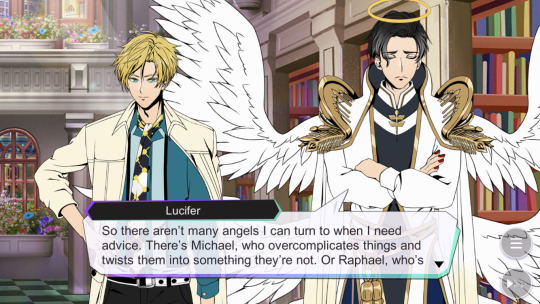
It’s hard to deduce just what this actually means. Either Michael tends to overthink things that just aren’t that deep (can empathize) and that in itself leads to needless complications, or he’s apt to misread situations and as a result gives poor advice. Or a combination of both.
My initial read on him makes me think that he thinks the best of humans/angels but the worst of demons. He is very, very complimentary towards MC as soon as they start answering his questions.
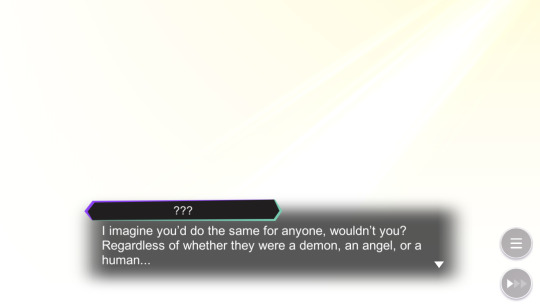
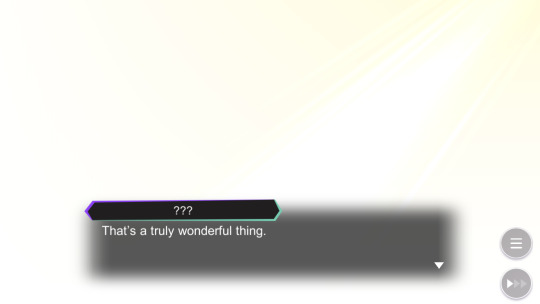
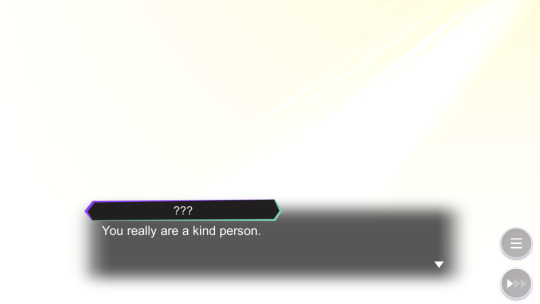
Am I now? Really?
It could just be the game making characters butter up the MC to make the game more enjoyable for the player of a self-insert character, but dude we just met.
When you tell him you did what you did out of love for Lucifer:
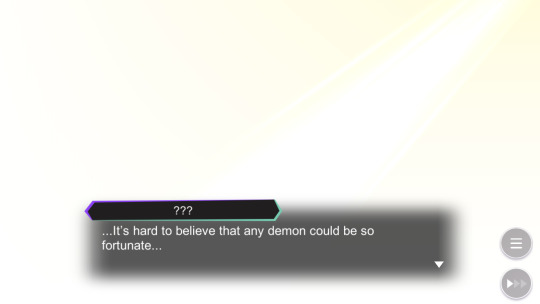
That’s a very telling pause/ellipsis. It’s like his brain momentarily short-circuits and he needs to regain his composure before he continues, and he still doesn’t sound entirely sure of what you just said lol
He also just outright admits he initially thought you must be wicked just because the brothers liked you, and this is a guy who is still fond of them himself. I think he’s having a very hard time with it.
So the inevitable bumps in the roads ahead with him will likely be a result of this, and/or his dad being an asshole. Neither he or Diavolo are actually in charge of the realms they’re overseeing -- they’re both de facto leaders -- so maybe the parents will suddenly barge in and try to knock over their sand castles for whatever reason. It is kind of weird that the exchange program has been agreed to in the first place, particularly on the Celestial Realm’s part.
Regardless, I have no clue what the next arc will be. I know we still have three trials left, but they could combine two again to leave more room for the actual storyline to progress. The climax is going to be the last trial of our sorcerer’s exam, or something happening afterwards. Not sure which one I’m willing to bet on yet: I remember Simeon’s play and the silly Blood Moon contest in Season 2 were what kept use preoccupied for Season 2 until SUDDENLY LUCIFER GETS AMNESIA AND THE WORLD IS IN DANGER AND WE HAVE TO STAB HIM TO SAVE EVERYONE. But they did heavily foreshadow that in the very beginning lol. They just didn’t fill in the blanks until much later.
I wonder what the trial of chastity is gonna be like and how hard we’ll actually fail and the game will need to overcompensate for that
#obey me#obey me!#obey me lesson 52#obey me spoilers#obey me lucifer#obey me diavolo#obey me solomon#obey me simeon#obey me michael#obey me barbatos#analysis#obey me lesson 53#obey me season 3
91 notes
·
View notes
Text
Why 3
Nearer and nearer this story creeps to its conclusion, and thus to that not-so-distant future day when @mysensitiveside will have received a complete present! Previously, in part 1 of this AU, a Myka Bering adopted a dog. That dog, unfortunately or fortunately, in fact already belonged to a Helena Wells. Myka and Helena, initially strangers to each other, have been walking the dog together, growing intermittently closer in the process, and they are at last, following the events of part 2, about to take a step toward something beyond the pedestrian. Let’s see how that goes.
Why 3
Later, in the parking lot, “You’re sure this is okay?” Myka asked as they began exchanging tangible, traceable information: numbers, addresses. They lived closer to each other than Myka had imagined, which made what Sam had done seem even more brazen... even more terrible. “I don’t want to make you feel like you—”
Helena looked up from her phone. “What exactly will convince you?”
“Convince me of what?” A stupid question; she knew it the minute she said the words.
But Helena again took pity on her. She put her phone in her pocket, and she moved close to Myka, then closer. “I’m not confused,” she said. Their coats were touching. “Are you?”
“Honestly? Yes.”
In response to that, Helena just looked. Did she blink? She leaned up still closer, a delicate, careful movement of body, accompanied by a turn of her head not quite against the collar of Myka’s coat.
Not a kiss, but the potential shiver of one... a “lean down and you’ll find out” feeling...
Myka was still high on the first kiss, not quite ready to dilute it with a second. “Tuesday?” she asked, and “Tuesday,” Helena affirmed, remaining near.
“I like this,” Myka said, and it might have been a warning—to herself and to Helena.
“I’m glad,” Helena said, a comfort against the caution.
I will see them three days from now, Myka told herself as Helena drove away, her dog buckled safely into his harness in the back seat. Myka had a similar harness, limp and empty, in the back seat of her own car.
I know what it’s like to see him without a week having passed. I have no idea what it’s like to see her.
How long could three days feel?
Long enough to make her tell herself, on Sunday, “You should cancel.” Because she hadn’t slept. Instead she spent open-eyed hours retreading her limited romantic past: college boyfriend, who lasted all of one semester; grad school girlfriend, who lasted longer, but only because they rarely saw each other, and when they did, they were too exhausted from long, long lab days and nights to do much of anything but share a cheap meal and go to bed. Nevertheless their breakup blindsided Myka, who expected reasons but received nothing more from her suddenly ex-girlfriend than “I was into it; now I’m not.”
Since then, the occasional night with another lonely chemist at a conference had been the extent of it. That was what Myka figured she would always be most comfortable with: no entanglements, no consequences. No nerve-wracking anticipations.
Tuesday was consequential, with accompanying nerve-wracking anticipation. Hence, “You should cancel.”
Entanglements. Leuko had been one, but he at least had been very clear. Food, walks, baths. Obviously Myka’s emotions had been involved, but it wasn’t as if Leuko was going to do anything to blindside her.
Except bark at someone.
In his defense, she conceded, he had a pretty compelling reason.
So what about cancelling? Myka knew why she wanted to. Why didn’t she want to?
I like walking with her in the park.
Everything she says about herself makes me want to know more.
She is physically more attractive than anyone I’ve ever seen in my life.
Kissing her one time made me wish I had keys to a castle, so I could give them to her.
On a parallel track, there was Leuko. Monty. The idea of interacting with him in his real home felt wrong—but the kind of wrong that could one day become right. Like seeing his leash in Helena’s hand.
Would I have been willing to keep walking in the park if she hadn’t been the one walking him?
Impossible to know. Traitorous to consider an answer of no.
And would I have felt that I could walk in a park with her in the absence of him?
Also impossible to know. Not traitorous to consider an answer of no, but surely cowardly.
So in the interest of at least a facsimile of courage, Myka spent some time pondering yet another question: What do you wear to watch a dog show with your ex-dog and his person, who might be your... well, who could say? Certainly not Myka. She landed on “clothes.” Just wear clothes. Because her ex-dog wouldn’t care, and if his person did—well, that would tell her something, wouldn’t it?
Knocking on a door on Tuesday night, clothed in clothes, she was a mixture of trepidation and, yes, hope.
“Come in!” Helena called, so Myka did. To her surprise, she was received into the house by Montgomery Clift. She’d found, over her days of thinking, that it was easier to call him that in her head; its length and formality kept her from slipping and thinking “Leuko.” Mr. Clift then escorted her down a hallway and into a large living space. “Are you a butler now?” she asked him.
He blinked. It meant either “Of course not” or “I am the most perfect butler who ever buttled,” and Myka said, “You’re right,” in answer to both.
Helena appeared a second later, and Myka held out the gifts she’d brought: wine in one hand, a paper bag in the other. They had cost her far less pondering-time than the clothes had, though she hadn’t realized that at the time, and that probably meant something, though Myka could not think it through now, not with Helena standing right there in front of her. Myka could barely think at all. Instead, she tried to explain: “I thought at first I should bring you something related to writing—a pretty pen?—but then I figured a writer wouldn’t be any less picky about equipment than a chemist, and I’d hate it if some well-meaning person gave me for example a pipettor I’d never use. Nobody would do that, because they’re insanely expensive, but that’s why you’re getting a boring bottle of wine. I brought this”—she extended the bag—“for Monty.”
Helena had gazed at her throughout that recitation, and Myka had in turn felt herself prolonging it, to keep those attentive eyes on her. Now Helena said, “You’ve gifted him...” She took the bag, looked in it. “Several corn tortillas?”
“Fresh ones. He likes them.”
“I didn’t know it.”
Which, Myka had to acknowledge, made her happy. But it was a selfish happiness, so she said, “I didn’t intend to know something you don’t. It was an accident: he was hungry, and that was what I had. And then when I bought fresh, they turned out to be his favorite.”
Helena said, to Montgomery Clift, “More favorite than cheese?”
He failed to respond, most likely due to his laser focus on the now-open tortilla bag. Myka offered, “Probably depends on the cheese.”
“It’s true he is discerning.” Helena paused. “So am I.”
Myka’s nerves, which had ebbed, returned—not fully, but as a vague itch of discomfort. “You don’t need to...” she started.
“What don’t I need to?”
“Try? Like that. Like any way at all.” For it was when Helena tried—as she had in the park, with her “so are you” about prettiness—that Myka lost her bearings.
“I don’t know where you are,” Helena said. Such a reasonable justification: of course she would try, if she wanted to move Myka to some particular place, some place she felt Myka was not.
“Here,” Myka said, but it was a yearn—to get closer to where Helena might have imagined she, and they, could be—rather than the truth. She needed to tell the truth, though: “Or at least I’m trying to be.”
“You don’t need to try either,” Helena said, her tone a balm. “Let’s start by getting to know each other better. I hope that’s what this evening is for.”
“I hope too.” Myka had never said anything more true. “I don’t like that I know your dog better than I know you. I regret it.” But, “Sorry,” she said to the soft butler-or-not who looked up at her, blinking wounded eyes. Or more likely, he was blinking tortilla-wanting eyes.
“We need to remedy that. Or rather, I want to remedy that, and I think you do as well. As I said, I’m not confused.”
“As I said, I am.” Important to be clear about that.
“Tell me why.”
Oh, the invitation. How could she respond? Weighing ideas of entanglements, consequences, anticipations...
Helena, blessedly, went on, “Because I feel that if I hadn’t told you I wasn’t, you wouldn’t be.”
That was indeed the entirety of it, so... “I like that you’re smart,” Myka said. “I like it so much.”
“I like that you are as well, chemist. Sit down. I have food to cook. On that topic, I regret I didn’t ask about allergies, so tell me now. I don’t want to inadvertently attempt to murder you.”
“You can’t. I’m basically insensitive.”
“Ridiculous. Monty knows better, and so do I.”
She delivered that perfectly, not trying, but rather as if she had a doctorate in quashing self-deprecation, and it made Myka smile. “If I were allergic to anything, leukotrienes would be involved,” she said.
“Do you want to explain them to me now?” Helena asked.
It was even more perfect, as an invitation, but Myka turned it down: “You’re busy. Food to cook. Can I help?”
“Sit. You look tired. Is that an awful thing to say? I don’t mean that you look in any way bad. You’ve most likely had a long day.” She stopped, her expression devolving into a sheepish wince. “I’m digging a hole.”
“It’s okay,” Myka said to banish that wince, charming as it was. “You’re right about the day.”
She hadn’t improved much on her Saturday sleep in the subsequent nights, but at least last night had been anticipatory rather than self-castigating. During the day, her concentration at work had been... not ideal. She broke some glass—dropped from nervous fingers—and Abigail asked her if she was intending to go on a rampage. She’d had to redo more than one assay. It really was a miracle she’d been able to get here on time.
So she sat, as instructed, and she found herself pondering various miracles: Helena was cooking food, and Myka, on the sofa, had Leuko—no, Montgomery Clift—beside her, as he used to be, and she wished she were a poet, so as to put into words what suffused her heart. “Does he sit like this with you?” she felt compelled to ask.
“He does,” Helena said. Weeks ago, Myka would have felt that as a knife. Now it was confirmation of all-encompassing comfort. “With me,” Helena went on, “and now with you. I’ve never seen him do so with anyone else.”
“Have you, though?” Myka asked him.
Of course he blinked those dark, beautiful, secret eyes. “Did she teach you to do that?” Myka asked him, and she dared a glance at Helena.
“I can’t imagine what you’re talking about,” Helena said. “All I personally taught him was that he should shake hands. And clearly that is not what is occurring.”
“Shake?” Myka suggested to him.
Montgomery Clift sat up immediately and held out his right front paw.
“Impressive,” Myka told him—told Helena—after a convivial shake had occurred. In all her time with him, she hadn’t thought to see whether he would do that. She hadn’t thought about training at all. He was so quiet and sweet. What else would she have wanted him to do? How often would they really have needed to shake hands? “How often?” she asked, softly, and she took his blink to mean “Not very.”
Helena said from the kitchen, “It’s starting in not very long, and I’d like to let Monty out. Will you watch him in the yard?”
“You’re going to watch me watch him, aren’t you?
Helena smiled. “Honestly, yes. But not for the reason you fear.”
“I’m not sure you have a true handle on the extent of my fears.”
“Educate me.”
“What do you write about? Or I guess I mean, what did you write about?” Myka asked. The question had come to her that instant, fully formed—not a fear, not as such, but rather a gray gap in her knowledge.
“Hm,” Helena said. “Let’s talk about that when you come back indoors.”
Montgomery Clift enjoyed his time in the yard. “Sorry we can’t walk,” she told him, but he was cavorting, sniffing, investigating, and didn’t seem to care. It made her sad that she’d had no space for him to do that, untethered.
They came back indoors, so: “So, writing,” Myka said. “I didn’t Google you. So I don’t know.”
“That is both slightly insulting and exceedingly considerate.”
Myka, flustered, said, “Point being I don’t know.”
“It begins with my having been a rather unusual sort of child.”
“That isn’t hard to believe,” Myka said, then cringed. “That’s probably also slightly insulting.”
“On the contrary, I think it’s exceedingly complimentary. Don’t we all want to be unusual? I do now, and did then... I would fix my attention on a thing that struck me as interesting, and I would not rest until I became expert in it. The smaller and stranger the better. An arcane slice of history, some esoteric gadgetry, a figure of obscure influence. As it happened, I could write about such things in a readable way.”
“Showing off what an expert you’d become?” Myka asked. She hoped that wasn’t insulting at all.
Helena smiled in affirmation. “It began like that, yes. One tried to become less insufferable when it was for wider publication. In any case, I sought such topics out for years—the rarities, the curiosities. I made a reasonable amount of money doing so, which is better than many can say.”
“So why stop?”
“I had it in my head to write a novel. Something with that same depth, but also breadth.”
“Do you still have it in your head?”
“Unfortunately, yes. Mainly in my head. Not on paper.”
“Should I not ask why?”
“Monty’s disappearance... derailed me.”
“Are you un-derailed now?”
“Not precisely.”
“Should I not ask why?”
“I’ve found myself distracted.”
“Should I not ask why?”
“You should know why.”
Was that trying again? It felt softer, not quite as discomfiting. “When does this dog show start, anyway?” Myka said.
“Very soon,” Helena said, and the way she spoke those very simple words reminded Myka, viscerally, of why she wanted to be here—Helena’s eyes were bright, her voice low but engaged. An edge of something like hunger crept around the periphery of Myka’s awareness.
The show itself was astounding. Myka had known she had very little knowledge of dogs as animals, certainly prior to her brief ownership experience. But she had not known that she had not known how vast the world of dogs, as rankable, judgeable animals, really was. An entire additional universe was folded into the one Myka thought she knew. The idea of breeds, okay, she got that. But groups? Handlers? Stacking?
“Can he do that?” Myka asked, about the stacking, that stance seemingly required for the judging of... dogness?
“Oh, watch. Monty, sit,” Helena said to the dog who was curled between them. She raised her hand as she said it, and just like that, up he sat. She pulled her hand forward then and said, “Stand.” He stood, his entire self on display, just like the dogs on the television. After a second, Helena said, “I should have cheese in my hand. Or one of your tortillas. He hates when there’s no reward. You see how the handlers hold the treats in their mouths, when they’re in the ring. Often they use liver.”
“In their mouths...” Myka shuddered.
Helena offered a sympathetic echo of the movement. “It’s apparently quite compelling as an incentive, and they can’t hold the brush or the lead that way. But it’s certainly among the many reasons I myself wouldn’t have been able to show him.”
“I don’t understand why being pretty doesn’t count,” Myka said.
“Shapes and sizes matter more than anything, and he’s slightly too small for a male.” Montgomery Clift turned away from her, seemingly intentionally. Helena laughed and told him, “You’re exquisite and you know it.”
“Why did you even want a Mittelspitz anyway?” Myka asked. “No offense, Montgomery Clift.” After trying it out loud, she realized it didn’t work nearly as well that way as it did in her head. “Monty,” she amended, and now he reoriented himself toward Myka, as if he were pleased. She was probably attributing far too much intentionality to him.
Helena said, “I didn’t want one.” Did Montgomery Clift turn even further toward Myka? “As I told you, there was a novel in my head, but I was too busy investigating those curiosities. Then I began to imagine that I might find time for it if I settled into a more routine everyday life.”
“So you got a dog?” Myka asked, recalling her own Leuko-routines.
“Accidentally. While looking into teaching positions, I was finishing up one of my last pieces, on the insular, sectarian cultures around rare breeds of dog. I met Monty’s breeder, and she happened to note that having a dog would certainly create routines... I scoffed, but then I met Monty himself, as a wee puppy, and there was no longer any question.”
“I can’t even imagine.”
Helena showed Myka several photos of that wee puppy.
“Oh my god,” Myka said. It was the only logical response.
“He didn’t seem real,” Helena affirmed.
And yet there the real Montgomery Clift was, clearly the grown-up version of those photos, blinking back and forth at both of them. A curiosity.
“You’re coming back tomorrow night?” Helena asked later, as Myka prepared to leave.
What a confounding question. “I... am I?” Myka staggered out.
“The show. It’s two nights. I thought you knew.”
That had probably been conveyed at some point, but Myka hadn’t paid sufficient attention. She had lost her purchase on the unfamiliar new dog-parade production-number world unfurling itself for her perusal on the television, as she was far more interested in the equally new world composed of one disconcerting woman and one unreal dog. What did it say that the latter outranked the former?
Right... as if that were a mystery. “I think if this evening has demonstrated anything, it’s that I know absolutely nothing,” she lied.
“Not nothing,” Helena said, mindreading. Then she read some more: “Surely you know that I want to kiss you goodnight.”
“I want to know it,” Myka told her.
“Then do.” She moved close to Myka, a sidle not dissimilar to her move in the parking lot, and this time Myka did lean down, did find out. It was not confusing at all, but rather like good clear water, bracing and inundating, roaring, silent, everything. If this was the first night, what would the second entail?
The next day in the lab, Myka allowed to Abigail, “Maybe she’s my girlfriend.” Tempting fate, probably, but fate was certainly doing some tempting of its own...
Abigail crossed her arms. Never a good sign. “Why do you always have to lie first?”
“Why... what?”
“You lie about having a dog,” Abigail said. “You lie about having a girlfriend. What’s next? Your side job for the CIA?”
“Very funny.”
“If you deny it, I’ll know it’s true.”
“Fine. My side job is CIA. What do you know about dog shows?”
“Are you going undercover at one?” Abigail countered.
“My maybe girlfriend knows a lot about them.”
“Then ask her, not me. People like to talk about what they know a lot about. Except you, but you’re weird like that.”
Valid advice, and an accurate description. Myka thanked Abigail for them both.
“And you’d lie anyway,” Abigail continued.
Myka didn’t thank her for that.
As she prepared to leave for Helena’s that evening, she found herself thinking on clarity. That she might at last have some.
Her phone buzzed—a text. She never got texts.
The text was from Helena.
It said: Don’t come.
TBC
P.S. Only a bit left to go, I swear. Poor Myka’s heart can’t take much more, anyway, and my goal in life, or rather in narrative, really isn’t to make her suffer.
#bering and wells#Warehouse 13#fanfic#Why#part 3#B&W Holiday Gift Exchange#bering and wells gift exchange#bering and wells exchange#mysensitiveside
37 notes
·
View notes
Text
2.02: Everybody Loves a Clown - My Rewatch Review
I sympathized with what Dean is going through in this episode more during this rewatch than I ever have before. Not just with the loss that he suffered, but also with the way he felt he had to deal with it. He obviously feels that he has to stay strong and reign in his emotions for the sake of others, only letting how he truly feels surface when he is alone; he is reluctant to share his grief with people that he does not know well, despite the fact that they are also grieving John’s loss; and he is also experiencing a lot of internal conflict regarding his father’s death. Dean’s grief is bound up with a significant amount of anger and guilt surrounding what he suspects his father did and why he did it, and the strength of those emotions are exacerbated by the fact that he can’t talk to anyone about how he really feels. He gets angry at Sam for not being honest about his emotions because he himself cannot be honest about them, and when Sam comes clean at the end of the episode, it sends Dean into a rage because he cannot be equally forthcoming with his brother without betraying his father’s trust. It is no wonder that he tail-spins out of control later in the season and does what he does by the end of it, and whether the writers knew where they were going with the season arc this early on or not, they did a great job of either setting up or playing through Dean’s motivations right from the beginning.
And that wasn’t the only thing I saw in a different light while watching the episode this time either, thanks to some reading I have been doing recently. In the past, I had always found it a little bit odd that, in this episode of all episodes so far, the injuries that the boys had sustained in the car accident were still around. I mean, from a logical perspective, it makes sense—it’s only been a week or so since the accident, and nothing really heals that fast—but they have sustained far worse injuries in other episodes (‘Shadow’ comes to mind), and the evidence of it is always erased by the start of the next episode. And this instance of it is made even more obvious by my own knowledge of the behind-the-scenes commentary on the previous episode, in which Jared, Jensen, and some of the other people who work on the show can be heard joking about ‘magic network cream’ and how all of their injuries will disappear by the next episode... and then they do not.
But a few weeks ago, right around the time that I started this rewatch, I read a great post on Tumblr that talked about the difference between ‘story’ and ‘plot’, which boiled down to the fact that sometimes things are done that break with reality as we understand it in order to serve the narrative arc of a story. And understanding that has me looking at a lot of things in this show (among others) differently, including this instance of their injuries not magically vanishing between episodes. Because, as I mentioned in my review of ‘Shadow’, I understand from a technical and plot perspective why the boys’ injuries don’t stick around from episode to episode—technically, it would be a waste of time and money for them to always be covered in injuries and scars, when from a plot perspective, their injuries are inconsequential. It is easy enough for the viewer to fill in the blanks when it comes to the reality of what hunting would do to Sam and Dean; we don’t need to see it on-screen all the time. But in this instance, there is a narrative purpose being served by the fact that their injuries stick around—because the tragedy they have gone through is deep, and consequential, and not something that either of them will easily recover from, and what better way to signify the emotional healing that they are both struggling with then to also show them struggling to heal from their physical injuries as well?
And just like that, something that seemed like a weird oversight in this episode makes perfect sense, and also brings me to a deeper appreciation of the story being told and the fact that the writers and the director and everyone else working on the show also know what story they are trying to tell and all of the different levels on which they can communicate the themes of the episode to the audience. And it makes me wonder just how many other times I may come across something in this show that once bothered me from a plot perspective, but will make sense when looked at from a story perspective. I look forward to keeping track.
It’s also worth noting that I thought the monster-of-the-week story in this episode was really good. I love that they reached outside of western mythology with the rakshasa, the special effects were on point—especially when the reveal occurs and the rakshasa’s face morphs from normal human to monster with that extremely creepy smile—and the misdirection that occurred leading up to the climax worked really well too. Though it’s never mentioned directly by the boys, it is easy to realize that they were led to draw the wrong conclusions by the monster itself, and it is interesting to consider the possibility that Dean was so easily misled by the blind knife-thrower because he felt especially awkward around him as a result of their initial introduction. Whether by accident or by design, the rakshasa gave itself the perfect cover. It was an extremely clever adversary, and it is a bit of a shame that rakshasas were never revisited in the show.
#supernatural#2.02 everybody loves a clown#spn rewatch#tgpcSPNr#the great pre-convention spn rewatch
1 note
·
View note
Text
why atla’s ending is bad
so this post has likely already been made before, but I’m new to tumblr so what the hell. I recently finished watching atla, and I thoroughly enjoyed the series. This post is in no way about how the series itself is bad; I really did enjoy the series. Rather, it is about how the ending does a grave disservice to aang and the philosophical theories in question.
One of the reasons I love atla is that it is willing to ask the hard psychological questions: the scene in the library about how everybody thinks their war is justified? That is an amazing scene, it recontextualizes the entire series up until that point and forces us to ask: is fighting the fire nation really as justified as we claim? This question is brought up even more as we actually meet people who live within the fire nation: we see that they are not taught history as it actually happened and they are often ruled by fear. They are not the monsters that they seem to be. However, and this is the huge however, atla refuses to actually address the biggest question of the series: is it morally correct to kill someone in the service of a greater good?
Up until this point in the series, atla mainly avoids this question by making all forms of bending essentially the same: sure, they all have different animations and such, but at the end of the day they all serve as different ways to knock people backwards until everyone is far away enough that they seem defeated. Obviously, this is a children’s show, so it makes sense that they would do this. But, while its ok to knock around enemy henchmen, no one (even kids) is going to buy that one of the greatest firebenders of all time is properly subdued by a kid, especially when aang is shown to be clearly weaker in some of the bending forms than he would like. So, the philosophical question of killing has to be brought to the forefront. However, while the writers seemed to get that killing had to be brought up at some point, they narratively structured the story to prevent the question from actually being brought up at all.
At the core of this question is the push and pull between consequentialism and deontology, the two major schools of thought on what defines a moral action. Consequentialists (broadly speaking) argue that an action is right if the consequences brought about by that action are right. Deontologists argue (broadly speaking) that an action is right if the action itself is right, regardless of the consequences. This post is not going to go into a full-throated analysis of either philosophy, but will simply state that despite what everyone on the internet likes to claim after having read the trolley problem briefly, there are some legitimate benefits to deontology (and consequentialism can often lead to some things that we would think of as morally dubious.)
Anyway: suffice it to say, aang is a deontologist. He is focused on doing right actions because they are inherently right, and he doesn’t believe in bending his principles just because it would be convenient or because it could lead to a better outcome in that specific instance. Principles are principles for a reason, goddamnit, if you bend them all the time, how useful are they? And despite the fact that a lot of people here on tumblr would definitely describe themselves as consequentialists, we applaud aang throughout the series for his decisions to be morally upstanding, even when it makes his life harder.
Here’s the issue though: deontology, even though it has some serious benefits (I am somewhat of a deontologist and pacifist myself) it also has some serious downsides. Sometimes, when you stick to your principles, bad things will happen. Sometimes, those bad things will happen because you weren’t willing to stop them. And while there is a larger argument that can be made about how sticking to what is right leads to a better world overall, that doesn’t help the fact that in the moment, deontology can seem like a really sucky philosophy.
The writers of the show never actually make aang face that issue with deontology, and they trivialize it as a philosophy. Throughout the second half of the third season, aang is portrayed as not having the stomach to kill ozai, or not wanting to do what needs to be done. It is implied that aang is weak for his beliefs, that he must overcome his weakness and pacifism to become the strong avatar the world needs to undo the horrible damage of fire nation imperialism. The issue with this, though, is that it never confronts the actual issue at play? What if (ignoring energy-bending entirely for a second) aang is entirely right to not want to kill ozai?
I posit that a non-murdery approach to the final battle is the actually correct decision for the world. The fire nation has been steeped in fear and anger for over a century, and their leaders have based all of this division and fear and nationalism on the idea that might makes right, that if you are strong and just and powerful enough, it is your right to spread this glory to the rest of the world. If aang were to beat ozai handily and murder him, all that he would prove is that the firelords were right all along: it is the right of those who have power to control those who are powerless. Aang killing ozai just proves that ozai was right all along. The only way to break the fire nation cycle of fear is to prove that there are other ways to approach conflict, to prove that a non-violent approach is not just preferable to killing someone, but is actually what is necessary for the world to heal and grow?
It is at this point that the readers who have read this far into this abominably long post say, “but wait chromecausation, aang didn’t kill ozai. That was the whole fucking point of the final episode!” And to those of you still reading: kudos, you have my gratitude. My issue is not actually with the ending of the story (despite the title of this piece) but the way that it was presented.
Because I just recently watched avatar (and I had seen some spoilers earlier on tumblr so i knew that something called energybending was coming), I realized that energybending was introduced AS A CONCEPT in the last 2 episodes, and it was explained as aang was using it to defeat ozai. This is literally the definition of a deus ex machina, a plot device that solves a previously insurmountable problem that arrived out of basically nowhere. I really really hate that the entire conflict of the series is solved through deus ex machina. It cheapens all of the struggles, and it makes the conclusions of the story that much weaker.
Think of how all of the arguments aang had with sokka, zuko, katara, the other avatars, and like a billion other people would have gone if it were known that energy-bending were a possibility. Instead of being “hey I don’t want to kill the firelord because it is morally wrong, even if that is a more dangerous path to take, but I think it will be better for the world as a whole” it becomes “hey instead of killing the firelord, I would like to take this equally easy option to not kill him but subdue him instead.” (The reason I say equally easy is because killing the firelord is shown to be fucking difficult to do). The existence of energy-bending renders the whole point of the argument moot, because of course in a vacuum it is better to not kill people. (I say of course here because the moral discussion at play is not whether retributive punishment is better than rehabilitative punishment, or whether the death penalty should exist. Those moral discussions rest on the premise that the victim is helpless and we in the position of power must decide their fate. The moral question here is whether aang should try to kill the firelord, because if he tried to hold back with bending so that he didn’t kill ozai, aang might actually lose the fight). Energybending does not exist with enough screen time for us to learn if it has drawbacks or is difficult to do. We are told that it is difficult, but so is killing the firelord during sozin’s comet; we need to actually see it in action first or discuss it ahead of time to actually know what the stakes are. Instead, with it being presented at the last minute, it seems like aang is given a cheat code out of his moral dilemma. He is never forced to confront the actual consequences of pacifism, and is never given the chance to prove why it is a good idea to stick to your principles even when you don’t have a deus ex machina up your sleeve.
I believe that aang was right to not kill the firelord, but because the mechanism was energybending, it means that aang is never forced to confront the idea that pacifism and deontology require a difficult route and that there is a good chance he will not succeed. Conversely, he is never given the chance to prove how his way of thinking is better for actually breaking the fire nation cycle of fear. Imagine, instead of energybending, aang was forced to learn all of the techniques taught to him by his teachers. When fighting ozai, he must take a heavy blow that he must heal through waterbending he is taught from katara. He is only able to dodge attacks because of the seismic sense from toph, and he must become comfortable enough with fire that he can redirect ozai’s lighting, as shown by zuko. This techniques are shown to be incredibly difficult, and by clearly setting up a path where aang is forced to take the more difficult route in order to stick to his convictions, it would strengthen the moment when he actually does, as well as provide a nice way to remember the journey along the way. If it were shown that aang had a way to kill ozai and chose not to, instead choosing to rely on his skill, it would show that he is committed to his convictions. Instead, the use of energybending almost implies that all of the knowledge up until this point was useless. What is the point of learning to bend if the only way to defeat ozai is through energybending?
Finally, I will say this: aang needed to defeat ozai in a way that did not rely on murder so that he can finally join the ranks of the avatars before him. When conversing with the previous avatars, it is clear that they think that aang should kill ozai. However, the actual words they speak matter too: aang must make a decision, he must serve justice. The other avatars do not actually speak on whether or not aang should kill ozai, but rather they speak to his conviction. Up until this point, aang is a kid who has the world thrust upon his shoulders, and he is trying the best he can, but at the end of the day he is still a kid. He doesn’t want to kill people because the monks told him it was wrong, and while he feels deeply that he wants to uphold that, he also doesn’t want to kill people because he is young and it would scar him. I choose to see the meetings with the avatars not just as them arguing for aang to kill ozai, but them also having a meta discussion with aang: he must make an actual moral commitment, and stick to the path he has chosen. In order to claim the mantle of avatar, he must strike out on his own and become an independent person with independent beliefs who is willing to talk to the avatars as an avatar. When aang walks back from the battle with ozai, he is able to talk to the other avatars on an equal level because he has committed to his own path and succeeded. He is no longer dependent on guidance; even though he is young, he is a fully realized avatar. By introducing energybending, the writers rob aang of that ability. They prevent him from joining the ranks of the avatars as someone deeply committed to pacifism even when there are no more tricks up your sleeve, and this is a damn shame.
1 note
·
View note
Note
Hey!! I just read your answer to that one anon about straight people in queer media and I agreed with everything ! I do have another question, though. is it ok for straight people to read smut of m|m or w|w ships?
hey darling! sorry it took so long for a reply; this has been sitting in my inbox for a few days as i’ve been running around hectically, but hey! answering it now!
long answer short: depends on the context
since this is such a complex answer, i’m going to go a lot more in depth with my opinions, but may i emphasize that these are my opinions. this is a topic that really does depend on who you’re talking to, but i’m seeing this with a “here are the facts in correlation to my experience, therefore this is my conclusion”.
i’m putting a ‘keep reading’ cut because i’ll be mentioning some very mildly NSFW stuff (in reference to my answer), therefore proceed with slight caution
to start this off, we have to think of the context of smut, how it’s used within fanfics, and the implications of reading smut. for sake of the argument, i’m not going to write what type of relationship is showcased in the smut *yet*
there is, of course, many types of smut. porn with plot, porn without plot, smut that’s within a larger fic that may only take up 10% of the story, if even that, etc.
in addition, we have to keep in mind what purpose smut usually serves within a fandom setting. it’s unlike most pornographic content, as in there’s a pre-set character and a context that they’re in (typically), as in reference to a setting we’r familiar with. we care about these people, and they’re performing a bodily action that hey, (most) people do at some point in their lives! in my opinion, (some) smut is comparable to television shows on premium networks that allow sexual content within the scenes. it’s a general “oh boy, they’re fucking! golly-jee!”
with the context of smut and the types of smut in mind, let’s dig deeper
let’s split them into two groups: fics that are about smut vs. fics that have smut.
let’s dig into fics with smut:
fics with smut, whether porn with plot or larger fics with smut in them typically follow a guideline of a story. they’re not there as just an outright fuck-fest, but rather have a story to tell. yes, even porn with plot. for example, here’s a pretty stereotypical porn with plot: person A and person B know each other somehow (sometimes friends, sometimes enemies! who knows!) and end up hooking up. then they do it again. and again. oh boy now they’re smashing but wait, there’s feelings??? what now!!! well, now there’s probably an emotional fuck, which leads to them talking and resolving into a relationship, right?
there’s a story told within that; it isn’t simply characters just smashing to smash, it’s an analysis into a character’s personality and how they would react to a situation that (typically) involves emotional attachment through sexual actions. hence, the term porn with plot. it’s like any other story, just with, yknow, sex as the driving factor.
then of course, there’s the story with smut. typically these involve either relationship building or established relationships where smut is used for one of two reasons, both of which involve trust. whether it’s a couple’s first time being shown in the fic, or it’s shown in the fic as part of their routine as a couple, or maybe even to show comfort. sex is, after all, isn’t inherently taboo and for most people, it’s a common part of life, so some writers chose to include it in order to show that.
let’s look at fics that are about smut now:
oh boy, someone’s getting down and dirty. you open the fic and maybe there’s a little exposition, but surely enough, a couple paragraphs down and wham, they’re at it.
there are called porn without plot. these fics can explore a number of things, such as possible headcanoned or canon kinks a character may or may not have, or it could be an exploration into how a character may act in a sexual setting, and so on.
with that aside, it’s still one thing and one thing only: sex. nothing much else to it. they smash, then it’s over. maybe it finishes with them cuddling or going on with their day, but that’s all. there’s no fancy way to put this, they’re just fucking! it’s probably the closest thing we get to pornography in fandoms without super-committed cosplayers and/or artists.
therefore, i need to highlight that that fics that are about smut are pornographic in nature. i’m not gonna call them outright porn, but they call it that themselves. porn with plot.
may i also include, before we continue, that there’s no shame in porn overall. i’m a sex-positive person and i say hey! have fun, adults! yknow, as long as you’re consuming it ethically!
now the difference is cleared, let’s look at consuming smut in correlation to one’s sexuality.
may i emphasize that we’re using “porn without plot” as something used to evoke arousal in those attracted to the people within them in the context of these examples. i am aware that there are plenty of people who read them just for the sake of cheering on their faves gettin’ it on, but i’m using a hypothetical context.
let’s use a couple example people in example situations.
straight guy read WLW porn without plot
straight gal reads MLM porn without plot
lesbian gal reads MLM porn without plot
lesbian gal reads WLW porn without plot
straight gal reads WLW porn without plot
immediately, we see a stereotypical, frequently referenced situation: straight guys watching (or in this case reading) WLW porn. most people see that automatically as wrong, right? this is because he’s unethically consuming this content that’s of people he’s attracted to and therefore sexualizing for their SGA (same gender attraction) and consequentially, fetishization.
in the same type of content, a lesbian gal consuming WLW porn isn’t unethical; she’s expressing her own sexuality through content of people like her.
let’s flip it. straight gal consuming MLM porn is literally the same thing as a straight guy consuming WLW porn. that’s it. it’s not rocket science, it’s someone consuming media that’s the sexualization of SGA in someone they find attractive, therefore is, say it with me, fetishization.
but we have a lesbian gal reading MLM porn. what’s she going to get out of it? probably, nothing, right? so what about the straight gal reading WLW porn? i think that’s fine, since hey, she’s not getting anything out of it! it’s not her fetishizing it for her own satisfaction.
i see the last types of situations as “sideline cheering”. i know this may sound odd, but your faves are getting it on and you just feel like cheering for them? yeah! cheer! i’ll use an example of friendships: i have MLM friends who tell me about their sexual experiences with their partners, and i’m not attracted to men, but i’ll cheer them on as a friend hearing about their friend’s good times (in a situation were we both open to sharing these details, of course). i see reading porn without plot while it doesn’t apply to you as that kinda stuff; supporting your pals having a good ol’ time.
now to move onto situations of fics with smut in them.
personally, i feel like anyone can read fics with smut in them because they tell a story. they serve a purpose of storytelling, and they just so happen to include sex, perhaps as a plot point, but maybe as an exploration of character(s) in a deeper way than “i wonder what they’d do in bed”.
now, i know that sometimes, the situation blurs, but for the sake of the question at hand, i’d say the context depends on specifically what type of smut the straight person is consuming.
again, as a disclaimer, this is my opinion. i fully understand people who have differing opinions in this, but this is just how i feel about the subject.
5 notes
·
View notes
Photo

New Post has been published on https://passingbynehushtan.com/2020/02/16/doctrine-vs-the-didache-of-jesus/
Church Doctrine vs. the Didache of Jesus: A Prophetic Think Tank

Didache or Doctrine?
Well, here we go again. The story about how 1st century Christain words were twisted and morphed into ideas that have little to no relation with the original. And what could be more consequential than that of the word “doctrine”?
The “doctrine” of faith, such as “faith alone” or “faith with works.” The “doctrine” of Christ, such as “fully man and fully God” or “a man that became divine.” The “doctrine” of justification as a free gift, without works, or justification by works. The “doctrine” of ecclesiastical authority, or the authority of scripture alone. The “doctrine” of a particular systematic approach. The “Doctrine” of a theological proposition. Are these really 1st-century Christian, Christ-ordained teachings (doctrine, didache) or something else?
Now far be it for me to suggest that none in this mix of truth and error is original Christian teaching. What I’m saying is there is a huge difference between a truth that is a conclusion and a truth which is a premise or a fact. A conclusion is just a series of words adding up to a faint outline of what it exists to sign. So is a concept for the knowledge for which it merely symbolizes. What I ask is if doctrine in its original form is a supernaturally demonstrated and historical truth about Jesus Messiah or a derived human representation or proposition of it.
The answer is simple, isn’t it? We know unequivocally what that answer is. But we sure don’t like it and our relationship with “doctrine” is sure not modeled after that answer.
Please don’t underestimate the gravity of this question and its reverberations through our entire conception of what it means to be a Christian and what Christian truth is ultimately. Our conception of “Doctrine” effects what of the Bible will be presented to the world as crucial and ultimate examples of Christian truth claims.
This, in turn, tells the world what kind of morality with respect to that transcendent Truth of the Father Christ essentially displayed. How our emulation of His Truth is a sign of our salvation in Him. Our grasp of this concept is not one vital component in the whole of the conceptual “Truth” meta-symbol, its the whole kit and kaboodle. “Doctrine” is “Truth” or Truth is a mere bystander loitering along the way to Christ that comes to help when there is some faith accident, ready to make things right. But what essentially did Christ teach, give us as doctrine, for us to give to others?
First, what is doctrine:
A belief or tenet, especially about philosophical or theological matters.
The body of teachings of a religion, or a religious leader, organization, group or text1
or
Doctrine, from Latin doctrina, (compare doctor), means “a body of teachings” or “instructions”, taught principles or positions, as the body of teachings in a branch of knowledge or belief system. The Greek analogy is the etymology of catechism.
These are pretty general. Let’s forget about these and take the meaning from the source. Doctrine is didache (διδαχή) in the Greek
from G1321; instruction (the act or the matter):—doctrine, hath been taught.
Our only real task is making sure that this didache, as Christ and the apostles used it, looks like itself and not gratuitously like the world’s general conception above. If it were limited to a mere “body of teachings” or “instructions” or “principles” or “positions” I don’t think we would have Christ’s didache. Why?
Because if Christianity is about for the first time in human history there is a divine disclosure of otherwise impossible knowledge about the existence, nature, and plan of this transcendent God, it’s not going to be about “instructions,” it’s going to be about the content of those instructions and that knowledge itself.
If doctrine is from a supernatural source and about transcendent reality, it’s then about knowledge content that itself shows supernatural origin.
Under the above criteria, is the concept of “doctrine” ultimately any teaching that is not transcendently self-attesting? Could it be teaching and knowledge that could have come from the creativity and resources of men?
Please keep this in mind as we proceed. This, my friends, if you profess faith, can change your life by a means that a conception of “doctrine” the church offers could never do in any number of relativistic years.
Didache occurs 30 times in the NT. In 13 other occasions the word διδασκαλία didaskalía, did-as-kal-ee’-ah is used:
from G1320; instruction (the function or the information):—doctrine, learning, teaching.
In 1 Titus 1:3, there is also ἑτεροδιδασκαλέω , “to instruct differently.”
1 Timothy 1:2-4 (KJV) Unto Timothy, my own son in the faith: Grace, mercy, and peace, from God our Father and Jesus Christ our Lord. As I besought thee to abide still at Ephesus, when I went into Macedonia, that thou mightest charge some that they teach no other doctrine, Neither give heed to fables and endless genealogies, which minister questions, rather than godly edifying which is in faith: so do.
Interesting that in the KJV there is one instance (Heb 6:1) that translates logos in Greek as “doctrine” in the phrase “doctrine of Christ.” Why I don’t have a clue. Perhaps it makes more sense than the “Word of Christ” or logos of Christ?” If so, we have to ask why it would make more sense.
Why to us it makes more sense is really the story here. The story is about how to fallen Man things that sound too arcane and foreign must be given the prosaic workover so it looks more like us. “Doctrine” has been given the prosaic workover.
This is a preamble to our post-cross historical age that became obsessed and fixed exclusively on “doctrine” as statements or conclusions, rather than a “teaching” of the word of Christ, which is an entirely different and much more exacting matter, as we will see.
Ok, what is it?
What kind of information is this doctrine? The most important and defining “teaching,” and from where they are informed, which joins every believer around a common set of facts?
Why would I even ask such a question, “what is Christian doctrine?” when everyone knows what is Christian doctrine? Everyone knows the historical beliefs of the Church. We also know it as the accepted propositions of a particular denomination. Of course, we also know what “doctrine” in the dictionary means? Asking this is almost like asking “in what year was the War of 1812 fought?” Or, “what is the meaning of apple pie?”
Since I’m asking for the definition of something that everyone already knows and has agreed upon, at least that doctrine is about the confessions of faith, how could I not but introduce yet another of a million articles talking about the Westminister Confession? Or quoting Scliermacher on dogmatics? Or pulling out a Catholic catechism? Or “the 5 Fundamentals’? That “doctrine” is essentially a creed?
Certainly, I would not be so presumptuous as to own pull out my own bullets of doctrinal devotion and contrasting them with nearly two millennia of work by our wise and prudent scholars. What, do I think that this question is open to some question like that which the Judgement of Paris entertained? How impudent! How could two millennia be wrong?
Yes, that is what I mean. Informed are two millennia from the same place. Namely, the underlying assumption of “doctrine” as that of religious propositions that are not their own evidence for their truth but nevertheless define Christian faith.
As I have implied and sketched out a destination, this article aims to establish not the topographical features of the common “doctrine” idea encompassed in “faith statement” or “post-1st century object of theological warfare,” but to get at the heart of it. To see if at that heart there might be something about a kind of Christian doctrine fallen through a 1900-year-old crack. Deleted or relegated, but still, the only kind which, if made singular and primary, removes the arguability of “doctrine” to give back its power.
The power to stand not only as a conclusion but a predicate. As a symbol and a substance of the truth it states, and return Christianity to more a kind of spiritual science than a scholarly and pedestrian mosh pit before another genius that wants to thrill people more with his own revelation than the one Jesus sent.
If it were so, then the divisiveness and covetousness end that comes with touting only from one’s own resources a belief that is open to equivocation, attack, and death. We want to give back to it what was instead unequivocally gutted from it: its self-attest-ability.
But to do this, we have to clearly open up for comparison what is that corrupt consensus reality on the subject of doctrine, how important the 1st-century conception of doctrine it is to the faith by comparison, and what is the cost of losing it. If we are then able to discover what is the real “doctrine” which that world echo chamber has refused, we will turn its own assumptions back on them.
“Doctrine” is essential? “Doctrine” is “truth.” Then any confession of truth which holds to a conception of a belief statement in spiritual things which is capable of supporting itself as true only out of the resources of the mind and emotions is not important to the faith and not “truth.” On the contrary, the cost of losing false doctrine is not only zero, but more like the resurrection of Christ from the dead.
Please continue to the next page…
The Consensus Reality: Schleiermacher
Since Friedrich Daniel Ernst Schleiermacher (1768–1834) is considered the arch dogmatist and the father of modern liberalism, and since we are living after him we are prudent to start with the one who best exemplifies what we believe about doctrine today.
Schleiermacher was a Kantian. Immanuel Kant denied the possibility of an objective, demonstrable divine knowledge. There was no way to “prove” Christian doctrine as true, and that is not its purpose. The purpose of Christianity is for the education of our passions or moral bearing, for the betterment of human societies. Kant was a functional atheist in this sense, believing that Christianity is not “true” in the classic sense, but still held dearly to the preforming of his Christian devotions and moral self-control. He was functionally an atheist, but very, very religious.
Schleiermacher followed Kant in insisting that Christianity has nothing to do with the belief in miracles, but one engaged directly with Jesus and his redemptive power. Look at these from The Christian Faith:
Page 109: Unity of doctrine in the church is not required.
P. 76: Doctrine is the “accounts of the Christian religious affections set forth in speech.”
P. 123-125: The whole of Christian Doctrine is “facts presupposed by antithesis” combined with facts that remain unchanged during the development of the antithesis and ” facts determined by the antithesis.”
P. 142: “religious feeling” is the essence of the Christian experience and the proposition that describes its basis is the “totality of finite being existed only in dependence upon the Infinite.”
P. 591: “The authority of Holy Scripture cannot be the foundation of faith in Christ; rather the latter must be presupposed before a peculiar authority can be granted Holy to Scripture.” The Old Testament was insignificant for this.
Any book can be the “Bible,” not necessarily the OT or NT.
Two forms of consciousness are knowing and feeling. Knowing and doing is the anthesis to feeling. Feeling sits between knowing and doing, and so is the “seat,” as Barth called it. The primary object of knowledge is therefore pious feeling.
Does any of this sound familiar today?
You may say that much of this is eschewed in Conservative congregations, but I assure you that none of them really do, as will be seen.
Although they fought and debated, Schleiermacher was essentially a Hegelian. Hegel disagreed strongly with him on the Trinity, which Schleiermacher thought was not settled because there was never any attempt to enunciate clearly by Christ and the apostles.
Hegel thought of history as a movement between a proposition, an opposing conception (antithesis) and an outworking synthesis. It is not important what is this thesis, antithesis or synthesis, but only if it works toward human freedom. Although discovery influences a new view of reality, it is clear from Hegel’s language that the focus is on the “proposition” moving history, not changing facts, and what people decide is true. History is human self-consciousness interpreting and re-interpreting itself: “History is the process whereby the spirit discovers itself and its own concept.”
The spirit is primarily its own object; but as long as it is this only in our eyes, and has not yet recognised itself in its object, it is not yet its own object in the true sense. Its ultimate aim, however, is the attainment of knowledge; for the sole endeavour of spirit is to know what it is in and for itself, and to reveal itself to itself in its true form. It seeks to create a spiritual world in accordance with its own concept, to fulfil and realise its own true nature, and to produce religion and the state in such a way that it will conform to its own concept and be truly itself or become its own Idea. (The Idea is the reality of the concept, of which it is merely a reflection or expression.) This, then, is the universal goal of the spirit and of history.2
I say his language, among many nuanced others, gives Hegel away. Notice, “the Idea is the reality of the concept, of which it is merely a reflection or expression.” Now, I speak of concept and idea as essentially the same thing because they are both framed within, not without, human power, but not that they don’t differ. An idea is an impression, a theory, a concept, is a procedure or plan.
To Hegel, the idea is the reality of the concept. The idea, the human idea, lying purely in human self-consciousness, is effectively the symbol’s meaning, and the concept is the symbol. You can argue over this, but the takeaway is Hegel speaks of this in terms of an ultimate human symbol, where all plans and theories are human constructions.
You can see this insular self-focus deeply within the conclusions of Schleiermacher.
Although I didn’t think he ever put is this way, to Schlienermacher Hegel’s “freedom,” the directional goal of all history, is “redemption.” It is Christian consciousness and the human redemption by the constructed Christ idea, rather than the knowledge of His objective reality, that is the heart of his philosophy. “Facts” are determined by contact with that which opposes the concept of redemption: ” the contents of the self-consciousness of the redeemed.”
The Christian consciousness of redemption entails concepts such as God’s holiness, righteousness, love, and wisdom; the opposing negative states of evil and sin; and the transition between them by way of Christ and the church through rebirth and sanctification. These concepts, further, presuppose others: creation and preservation, an original state of human perfection, and the divine attributes of eternity, omnipresence, omnipotence, and omniscience.3
Simply read it all in context. Redemption by the guidance of doctrinal conclusions. Notice that one set of the doctrines of redemption presupposes others, and the whole is a model of redemption by Christ. Nothing of this has anything to do with a revealed faith, a faith that grounds itself on the historical appearance of God which shows itself by demonstration. Translation: forget Messianic Prophecy, it about “redemption” the concept, not the reality.
Now, I’m not going to waste a lot of your time. I’m not going to go through the Patristic Fathers, Aquinas, Augustine, and then back up to Barth to show you this pattern. The subjectivism, the philosophy, the self-experientialism, the Age of the Creed, and so on. But let me just mention one: The Didache, The Lord’s Teaching Through the Twelve Apostles to the Nations.
Its a kind of catechism, a policy of the church order. This is a very old document. Some date it from the second century but more from the 1st century. But, I beg you to remember that age does not mean original, and there is nothing to suggest this was written by one of the Apostles. At this point, the church was expanding and adjusting to the world around them, and if there was something true in what most were doing there was just as likely to be something false in what others were doing. If subsequent ages showed an error and mainstreamed it then they got it from somewhere.
The Didache on the surface is a very innocent document. All it does is lay out some basic guiding theological assumptions. But this is not the earlier and genuine manner of Christ or the Apostles when they spoke of these. It was always with reference to the revelation upon which they were predicated.
They did not ignore the parabolic nature of Christ’s truth, such as that within the Sermon on the Mount. They did not suggest that you are pure and blameless because you acted in a certain way. And they did not suggest that a doctrinal proposition was all you needed to believe with respect to the Truth of Christ. But the Didache does and as such its the start of what we have today.
Now, I can only go by the document itself. I understand that there was an unstated subtext to all of this, which is belief in that original messianic, scriptural phenomenon. The problem with the document is that it never mentions them, but strips them from the Apostolic habit and only talks about the old, Greek and pagan idea of morality as doing a thing and believing a thing. Because of this, it is a well-intentioned disaster.
Did you know that “If someone gives you a blow upon your right cheek, turn to him the other also, and you shall be perfect?” That, “Woe to him that receives; for if one having need receives, he is guiltless?” Did you know that murders, adulteries, lusts, fornications, thefts, idolatries, magic arts, witchcrafts, rapines, false witnessings, hypocrisies, double-heartedness cause spiritual death?
Of course, the author means they are signs of spiritual blamelessness or spiritual wickedness, not the cause of it. But with this language what is stopping anyone from concluding otherwise?
Please continue to the next page…
Christ’s intention in the Sermon on the Mount was to wrap physical behavior as a sign around his prophetic revelation, which was to be known and believed, not the goodness of what someone does or says. As was his habit, He did not do it directly, such as saying “because you believe that the prophets foretold me as Messiah and I fulfilled them, act in such as a way to show the world that what you believe matches what you do.” He gave it in parabolic fashion. But why?
Because the Sermon on the Mount is a prophecy as much about what the true Christian demeanor will be as it is a prophecy about what it will not be. Which is not just “murders and blasphemies” but mostly those who want to involve themselves in a Christian religion by cutting out the first clause “because you believe that the prophets foretold me as Messiah and I fulfilled them,” from the second clause, “act in such as a way to show the world that what you believe matches what you do.” Christ is hiding a crucial truth about a future faith because if stated plainly people will just go around robotically mouthing a formula they are supposed to find for themselves.
The SOTM is the greatest example Christ ever gave of His transcendent genius, so much so that even today we don’t get, nor want to, the difference between doing and essential believing.
Not that the Didache shows what true Christian subtext they were really operating under:
But after you are filled, thus give thanks: We thank You, holy Father, for Your holy name which You caused to tabernacle in our hearts, and for the knowledge and faith and immortality, which You made known to us through Jesus Your Servant; to You be the glory forever.
What is this “knowledge?” What is this “Holy name?” Just “Jesus?”
I’m going to go right to the Bible and show you what the whole of human history is, by contrast to the Christ’s truth with respect to “doctrine.”
Not Ditto for Didache
Now, none of this will matter to Scliermacher-ites. It won’t matter for Catholics, LDS, Eastern Orthodox, Unitarian Universalists, JW’s, and just about all Protestant denominations and strains which put what you personally believe over why you objectively believe, either practically or explicitly. It only matters, or should matter, for those that really, really mean it when they say the Bible is the sole rule of faith or practice.
It is more than a little interesting that this didachḗin its first NT mention comes in Matthew 7, after a long discourse by Christ setting forth the main doctrinal question: what must one believe in order to be saved?
The Sermon on the Mount is about this, not “be good and nice and all and you are then a follower of Christ.” We think the ideational “what,” not the transcendent “why,” is this “doctrine,” and if asked to give one we will quickly answer something like “Jesus is Savior,” “the blood of Christ cleanses from all sin.” Especially in light of the following:
Matthew 7:13 (KJV) Enter ye in at the strait gate: for wide is the gate, and broad is the way, that leadeth to destruction, and many there be which go in thereat:
See, the narrow gate is “Jesus” and “Jesus Saves.”
Fine, those are true. But what is narrow (στενός), a particular, restrictive, precise, exact, more difficult, less traveled gate into Truth, to Christ, to the sheepfold, in relation to a definition of “doctrine?” Is it just another kind of religious statement, and the true one only if the statement is believed true? Well, Jesus gave the answer by context:
In vss. 9-11, we have a serpent, stone, bread, fish, good and bad gifts. We give good gifts to our son when he asks, not inert and worthless ones. So is the difference between the doctrine of Christ and that of the Pharisees.
The Law and the Prophets (v.12) are summed up by Christ as good gifts, not evil ones. That is not a faith statement. It’s a faith knowledge, and one specifically of Christ in that revelation. We should give to others transcendent, objective Truth, not lies. Not pharisaical law-keeping, not the Shema, not the 613 Mitzvot, not tradition, not mouthing certain true words, but believing the true Phenomenon of God before them, as we would have others to us. Because:
Matthew 7:14 (KJV) Because strait is the gate, and narrow is the way, which leadeth unto life, and few there be that find it.
Jesus then proceeds to give such good gifts in his doctrine.
Matthew 7:15 (KJV) Beware of false prophets, which come to you in sheep’s clothing, but inwardly they are ravening wolves.
The context for this doctrinal truth is set on false prophecy and true prophecy. That prophecy which is Satanic, Pharisaical prophecy, the core idea of false doctrine, over against that of Messiah and then Jesus Messiah. False prophecy and prophets are animated by lies such as righteousness through keeping the Law, or righteousness by believing and reciting the Shema. True prophets are animated by a kind of revelation of God’s truth, which is alone capable of grounding and motivating their righteous actions, and that truth is the truth of the Christ of the Prophets. The reason all along for the Law and the Shema.
The false prophets in mind prophesy in Jesus’ name, cast out devils in his name, and have done many wonderful works (v.22). The works are certainly not evil. These are what Christians are supposed to be doing. Obviously, “works” means something else to Christ.
These false prophets are then professing Christians, not atheists, doing the right things, uttering the right words. Since the “fruit” of which Jesus asks us to test for good and bad is then not what they do and say, it must be on why they do and say. Their scriptural motivations, if there is anything at all scripturally motivating them.
“Well, then, why you believe is still a doctrine, like “Jesus saves!”
No, it can’t be, at least not by our common conception of the word “doctrine” as religious concepts (ideas). The things these pretenders do is doctrinal, we must remind ourselves. If doing good is correctly thought good when it reflects a good belief and a mental/spiritual state, but believing is thought the belief only in a concept, which is a representation but not necessarily a fact, then our functional notion of essential doing is the same: that which is merely an appearance, not a substance. Our idea of “doctrine” is then at variance with what we know about symbolic reality, that symbols are indicators of ultimate reality, not reality itself.
If the doctrines the Pharisees hold are correct by action, then Christ, again, is talking not about what they are doing, but why. He is not talking about Doctrine as what is said, but why. He is not talking about statements, or what informs statements from personal choice, or what informs statements that could easily come from intelligence, craft or imagination, but that which is distinctly impersonal and supernatural in its origin. “Jesus saves” is not. Although true, it’s a human construct, a concept, that is meant to sign that impersonal and supernatural knowledge, not act in its place.
What we are saying is that it’s not the content, the external statements of a true or false confession of these false prophets in the Church, but perhaps a container of one, it’s informational, scriptural premise. Obviously, these people are saying and doing the right things (“cast out devils in your name), but they apparently have no revelational control, the container, over that expressed belief. It’s a heart problem, not a problem of expression, which is very deceptive.
As he always does, Jesus does not tell you openly “the right motivation is Me in the prophets, now being fulfilled.” He does it in parabolic fashion. Again, by subject context. He has already mentioned the prophets twice. Now he tells you what the doctrine of the prophets. Who would have guessed that the doctrine of the “prophets” is prophecy?” Ironically, the relatively few that were genuinely, unhypocritically searching for and loving Truth.
“Doing” his sayings (7:24) is not doing by “casting out devils in your name” or “many wonderful works” or about being nice. “Doing” is believing and prophesying Jesus by the prophets. This is the “rock,” both Christ Jesus and His Prophetic Word of demonstration, that will not be washed away “when the floods came.”
This is Christ giving a prophecy of the future as a prophetic argument for doctrine and faith in the OT prophecies of Messiah so promised and now fulfilled;
Matthew 7:27 (KJV) And the rain descended, and the floods came, and the winds blew, and beat upon that house; and it fell: and great was the fall of it.
Yes, the “Rock” is Christ, and Christ is a doctrine, but “rock “is certainly not the “doctrine” of external appearances and creeds, but”Rock” means something truly spiritual. It is that peculiar and special and unique spiritual motivation by the only stream of Scriptures which could ever be put as Christ’s informational equal.
Now that we know what is “doctrine,” what about the doctrine of notitia (notice, understanding content), assensus (to agree with), and fiducia (the assent of the intellect to the truth of some proposition) in Reformed conception?
Please continue to the next page…
In the way that I have just described it, this is not a “doctrine,” because “doctrine” is not propositional truth, its the revelational knowledge itself. That truth requires propositions, but they are submissive to that revelation. It goes without saying that there is something about this epistemic scheme that is true and doctrinal, that to believe one must know and understand what is to be believed. To agree with it and trust it. What is not agreed is that doctrine is propositional content, propositional agreement, and propositional trust in religious or philosophical concepts.
The false prophets are by all appearances not to be faulted by their doctrine if this if the benchmark is just concepts and religious works. But could their fault be the shallow depth to which they believe their propositions? Well, it would have to be to the depth to which they believe a faith claim by its proof which is supernatural.
Christ did does not make idle propositional claims to which he expected notitia, assensus and fiducia, but made a demonstration of propositions that he expected to be obeyed directly in faith. His demonstration is that of supernatural showing and fulfilling, not claiming. Proving, not suggesting. Real supernatural phenomena, not platitudinal confessions. The fulfillment of Messianic prophecy, not “Jesus is Messiah, the Son of God.”
Mat 15:9 refers to the doctrines of men opposing that of 15:8:
Isaiah 29:13-14 (KJV) Wherefore the Lord said, Forasmuch as this people draw near me with their mouth, and with their lips do honour me, but have removed their heart far from me, and their fear toward me is taught by the precept of men: Therefore, behold, I will proceed to do a marvellous work among this people, even a marvellous work and a wonder: for the wisdom of their wise men shall perish, and the understanding of their prudent men shall be hid.
Therefore, “doctrine” in v. 9 is the doctrine of the Messianic Prophecy of Christ.
In Mark 7:7, the exact same doctrine and exact messianic prophecy is cited.
In Romans 12:7, Paul uses διδάσκω, in the Authorized Version “teaching.”
Ephesians 4:14, Paul uses διδασκαλία: he refers to the doctrine of 4:13:
Ephesians 4:14 (KJV) That we henceforth be no more children, tossed to and fro, and carried about with every wind of doctrine, by the sleight of men, and cunning craftiness, whereby they lie in wait to deceive;
Ephesians 4:13 (KJV) Till we all come in the unity of the faith, and of the knowledge of the Son of God, unto a perfect man, unto the measure of the stature of the fulness of Christ:
“Knowledge of the Son of God” is not primarily experiential knowledge, as the Church would have it. It’s not your feelings and imagination as your point of contact with God, its a witness to a kind of personal appearance of God himself in objective reality. That appearance in objective reality is either in the form of a theophany in spatial reality or one in temporal reality from a record of history and the results of moral judgment.
It’s the same as in Phillipians 3:8, “the Knowledge of Christ.” Nowhere in any epistle does Paul speak of “knowledge” in the personal sense.
Col 2:22: “the doctrines and commandments of men” are set in contrast to the doctrine mentioned here. Religious ordinances are:
Colossians 2:17 (KJV) Which are a shadow of things to come; but the body is of Christ.
Then, we have 1 Timothy 1:10 (KJV)
For whoremongers, for them that defile themselves with mankind, for menstealers, for liars, for perjured persons, and if there be any other thing that is contrary to sound doctrine;
Which sound doctrine is identified here? In 1 Timothy 2:5-6 (KJV), we have: “For there is one God, and one mediator between God and men, the man Christ Jesus; Who gave himself a ransom for all, to be testified in due time.”
This is a perfect description of Messianic Prophecy in toto, “to be testified in due time.” That is, Jesus gave himself long before, before the foundation of the world, as a Promise to mankind. This was fulfilled “in due time.”
1 Timothy chapter 4 contains several instances of this word: verses 6, 13 and 16.
All of this is prefaced from verse 1 of 1 Timothy 4:1-3 (KJV)
Now the Spirit speaketh expressly, that in the latter times some shall depart from the faith, giving heed to seducing spirits, and doctrines of devils; Speaking lies in hypocrisy; having their conscience seared with a hot iron; Forbidding to marry, and commanding to abstain from meats, which God hath created to be received with thanksgiving of them which believe and know the truth.
The Spirit prophesied of latter times of apostasy of the faith.
Then, in 2 Tim:
2 Timothy 3:16 (KJV) All scripture is given by inspiration of God, and is profitable for doctrine, for reproof, for correction, for instruction in righteousness:
“All scripture” is not at this point the New Testament. It was still in process. This refers to the Old, and if to the OT to the OT revelation of Christ within. This is “doctrine.”
2 Timothy 4:3 is a prophecy about doctrinal prophecy. In later times people will throw away “sound doctrine” for lust, being informed not by this doctrine directly but by false teachers of another kind of doctrine. I shudder when I read this!
Need I say more?
Look, guys, it’s not about you and me. It’s not about anything that we do or conjure. Doctrine is not a matter of choice, or of our choosing, or of our imaginations and feelings. Doctrine is not even conceptual. Doctrine, although a concept, is first a kind of compulsion of an honest man around a divine phenomenon, which a concept can only represent, and also falsely represent. The concept and “doctrine” concept is not God or doctrine. Even the concept “God” is not God, its a concept, and God has nothing to do with your control or cleverness in coming up with a way to think about Him which is not the same as himself.
Have you seen this phrase on a church sign sometimes: No Jesus, No Peace; Know Jesus, Know Peace? Let me change that a little bit, because we don’t know Jesus because we want peace, because “peace,” like Jesus Messiah, is not really idea an idea, its a point of exposure and transformation before the reality, the fact, of God shown in history.
No Messianic Prophecy of Christ, no Christ. Know Messianic Prophecy, know Christ, and his doctrine.
Did you ever expect that God might lead you to stay a place firmly within your own spiritual tradition or settled perspective yet one that is firmly outside of it? That is a description of the supernatural residing in Matter, or Christ enfleshed. Of transcendence taking up residence in the common. The real place in which we as Christians were ordained from the beginning, not a cultural consensus reality. Maybe God led you here because he wanted to turn the light no inside your heart about a precious truth that consensus reality is not wanting to give you. If so, take a chance, be patient, and read on. Here is one truth leading to many that might change your whole perspective on faith.
please see:
Christ and the Noun Norming of Transcendence: A Prophetic Think Tank
When I Survey the Wondrous Nace, part 1: A Prophetic Think Tank
https://www.yourdictionary.com/doctrine ↩
Lectures on the Philosophy of History, second draft, 1830. Translated by H. B.Nisbet, 1975 ↩
http://scriptoriumdaily.com/schleiermacher-trinity-and-redemption/ ↩
0 notes
Text
Gilmore Girls
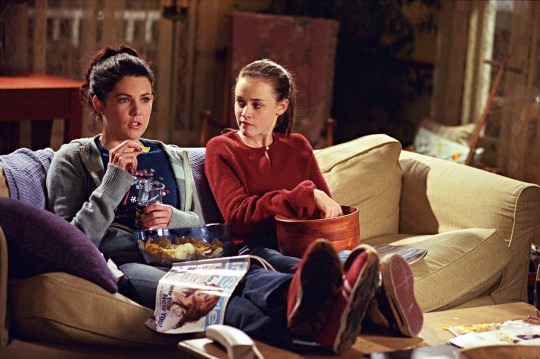
Gilmore Girls is better than everything else that’s out now, so let’s talk about it.
The show, still deservedly a favourite among very many, has a conspicuous and especial place in the lives of many a Gilly, this author no less. Having watched the now classic (non-sequentially) following its release, when I was just a few years shy of Rory, I returned to it in 2019 to watch it the whole way through, now a few years shy of Lorelai.
The difference in perspective, and all that which still resonates to boot, is astounding.
Somehow the ending wasn’t ruined for me, nor A Year in the Life which we’ll get to later. I’m far from the first guy to write about or fall madly in love with Gilmore Girls and if you’re not listening to Kevin T. Porter’s and Demi Adejuyigbe’s Gilmore Guys then you’re really missing out. Take these as the reflections of a most ardent fan who came to the show relatively afresh, did a Luke, went all in and found something that still sets a standard in scripting, character-building and female-driven storytelling, for which we are sorely lacking and still so grateful to Amy.
Spoilers herein for Gilmore Girls and A Year in the Life and, just so it’s out of the way; Jess, obviously. Dean quickly became a one-note boyfriend (who cheats), Logan (yes he did grow as a person) never near actively enough supported Rory in furthering her aspirations unlike others around her and Jess was the only partner who both held a candle to her intellectually and didn’t let Rory coast on her least forgiving qualities. I’m not counting Marty.
First thing’s first – story and plot. More often forgotten than not, they’re two different things. Gilmore Girls, as it was hurriedly pitch in a last ditch attempt to sell a show to the network, is about a mother and daughter who are more like best friends. Whenever it’s just the pair interacting the show was at its far and above best and never got tiring, not once, and was never as strong when Yale split them up or the revival, atypically and so consequentially, chose to see Rory and Lorelai apart for whole stretches.
Exceptionally cast, as good as Alexis Bledel was its Lauren Graham who ultimately drove the show and she never gets near enough credit for her nuanced portrayal of one of the most complex characters in modern television. Just look at the wordless despair, affection and resolve that passes across her eyes in the seconds before she steels herself for the proposal and season 5 cliff-hanger. Ask yourself how many performers can achieve such a range of emotion without dialogue in so few beats; there are few.
Significantly, mother and daughter besties are actually not what the show is about. What’s really going on is the tragedy of intergenerational disharmony as the mother who rejected her wealthy upbringing for a more regular life sees her daughter in turn rebel against her for the elite world she abandoned. With story and plot elements as strong as this, there was much to work with.
The spectre of a 16 year old Lorelai with a little bundle rocking up on the porch of the Independence Inn pleading for any job hangs over the show’s entire run. There’s been a fair few critiques over the years that Gilmore Girls is elitist or insular for its focus on small-town Connecticut which for many who haven’t been there can appear like a privileged haven.
Gilmore Girls is more accurately about a young woman and mother who didn’t get the support she needed from her family and set out to make a life where she wasn’t reliant on anyone but herself. The show, thankfully absent hackneyed flashbacks to supplement a narrative which didn’t need padding out, did however proffer us one glimpse into Lorelai’s early years establishing that Richard, amidst a great disdain for what was then very scandalous, insisted Lorelai marry the useless Christopher.
Anyone who thinks Lorelai’s circumstance or Rory’s for that matter reflects a privileged position needs to check it and on the matter of Connecticut there are many families who arrived there far from being a Richard or Emily, this author’s included; it being as diverse a place as the show’s myriad of characters suggests.
Now to Rory. Many (most) viewers were disappointed in the arc she undertakes and continues well into A Year in the Life. Yes it’s frustrating when you see characters you love take paths you’d rather they didn’t (those hoping for a happier end to Jaime’s story can relate) but her simply being on this trajectory as disappointing as it is isn’t a fair criticism of the show in and of itself and is one it has been unreasonably burdened with. For those who hate to see elitist Rory, it bears acknowledging the subtle parallel the series draws with Lorelai’s own (if more widely relatable) snobbery; think just how many times she judged or forewarned of someone simply for their being rich.
Those who were sad to not see Rory (or Lorelai) grow in key respects at least until the very end of season 7 point to this as a flaw in the series. This mistakes however the important distinction, one drawn as rarely as between story and plot, as regards character building and character growth. For the volumes we come to learn about Rory and Lorelai they conversely (and uncommonly for a character-driven series and moreover one of this length) don’t grow very much. We may not like it but hey, it’s a fact of life and often people don’t change, sometimes even after 10 years. It’s an unusual, dramatically refreshing theme befitting a drama and yes, Gilmore Girls is a drama. Like The West Wing given the volume of dialogue and hilarity it remains funnier than most comedies yet is still at the core a coming of age drama.
It is a nominally rare thing to see sustained character growth in this most distinct of series, later rendering Emily’s arc in the four most recent instalments all the more resonant. When Lorelai cautions Lane in season seven (the only era of the show when overwrought story beats infamously overtook character-driven drama) that she had best prepare for a circumstance where Lane’s children embrace the religiosity Lane rejected, it could fairly be highlighted as an unnecessary meta intrusion or an annoying ‘state the moral’ moment. It is however one of the only occasions emblematic of explicit character growth, coinciding as it happens with Rory having to contend with her most consequential instance of professional rejection. For being distinctive it resonated all the stronger in a series that would rather grow its characters and their world than the characters themselves; in modern terms a relatively novel and here welcomely idiosyncratic approach to storytelling emphasising bittersweet and very relatable aspects of our lives and interpersonal relationships.
The realm of Star’s Hollow being invested with a great deal more personality than most fictional settings, Lorelai and Rory’s narratives notably ground to a halt in Summer to see a musical tableaux of the town. If admittedly outstaying the welcome, it was a nice opportunity to say a farewell to the only significant character herein which didn’t get any dialogue. An affectionate ode throughout to small town life, it was well to remind us that every stop on the highway has a Taylor and Kirk, though rarely ones so lively and repeatedly entertaining; even if Kirk towards the end did go over the top.
Who never went over the top was Melissa McCarthy; it being a special pleasure to see her in pre-mega fame mode sharing her best moments alongside Yanic Truesdale, as well as a few hints at the more exaggerated roles she would later take on in some of Sookie’s most strident moments. The pop culture references were too a joy for any junkie; with the show (take note modern cinema) graciously never skipping whole beats to let one-liners or hark backs sink in, instead trusting that we’d get it or appreciate the resonance nonetheless.
This was conversely one of the flaws of A Year in the Life; but for allusions to Game of Thrones and a couple of other tidbits there wasn’t much acknowledgement in the scripting choices that this world had aged at all. There still being the ‘no cell phones’ sign in Luke’s after all these years, as fond a recall as it is, was just too much a stretch; on par with the infamous Game of Thrones-esque (yes Gilmore Girls did it first) roll credits moment when Rory delivers her manuscript.
For all its flaws and clustered cameos the addendums did however bring back Jason Stiles for a dignified farewell. A character very short-changed by his series’ conclusion (and lack thereof), when written out there was never a sense of closure like that proffered his contemporaries which fans indeed got ten years later.
And this brings us to the much touted ‘last four words.’ “Mum,” “Yes,” “I’m pregnant.”
It’s both a lacklustre and exceptional end in respects. Sure it would have had more of the intended resonance those ten years ago when Rory, mirroring Lorelai’s earlier experience, found herself at a stage of her life still yet to realise many of her goals that a newborn child would then and here implicitly affect. It still bears its impact but like much of A Year in the Life’s recurrent storytelling and character motifs it doesn’t resonate as desired and as it would have that era ago within a world and set of people who have now inevitably aged.
The theme and consequences of unplanned pregnancies has also already been widely explored in the series between the experiences of Lorelai, Christopher, Lane and, most unnecessarily, Luke. It’s far from improbable that any one or all of these figures, including Rory, would experience an unplanned pregnancy, yet when it came to introducing April the familiar story beats had already been well played out, as distinct from the more intimate and procedural arc with which Lane’s pregnancy is treated.
Rory’s announcement does however reflect the core theme of the series in children and parents, despite intentions and efforts made, replicating their forebear’s cycles. Despite it being foreshadowed that Logan is the father, he being evidently modelled on Christopher, here the show does not go for a bittersweet note but a heartfelt, cautionary one. As the series repeatedly reminds us, it’s far from unfortunate that children have similar experiences to their parents, or indeed that families continue to procreate. It’s just that, as when Rory dropped out of Yale, whatever happens in children’s lives may or very likely will still happen in spite of anything and everything a parent may want or try, and we’re all just along for the ride.
A Year in the Life’s highs and lows notwithstanding, it was well worth the hours to spend that much more time with our girls and loved ones (the most hilarious Paris’ return was probably the highlight) as it was over so many months and years. If you’re craving the qualities and depth that so much modern storytelling is so lacking, look no further.
Gilmore Girls is now streaming on Netflix
#xl#film/tv#netflix#gilmore girls#lauren graham#alexis bledel#melissa mccarthy#yanic truesdale#amy sherman-palladino
1 note
·
View note
Text
Evolution (Post 93) 6-17-15
Some friends of my parents stopped by this week. They are a fun couple. He is a folksy, puttering, retired physics teachers who once took my father’s side in a debate with other faculty members about why the lighting fixtures in the dining room were swinging back and forth in time. “Hal’s conjecture is both right and wrong,” Mr. Dorson offered in mediation, “While he is right that this is an earthquake, Hal is wrong about the oscillating motion of the chandeliers. They are stationary; it is the building that is moving back and forth.”
It is helpful to have a physics teacher around to interpret natural phenomena, but for his wife, a liberal librarian, being married to an ultraconservative who is going deaf can be a trial. I believe she has taken up gardening and visiting museums as a means to deal with the relentless onslaught of Fox News with the volume turned up to eleven. It heartens me to see two people with differing views living together in toleration rather than consternation. It is easy to see though, who a blaring news or sportscast could upset peace within an American family.
The news doesn’t really interest me much anymore. Today my mother asked me what I thought of the drama of some felons that had escaped from prison somewhere quite a while ago but hadn’t been caught yet. Initially, I thought she was talking about the Texas jailbreak from about a decade ago. Come to find out she was talking about a new escape that I had only vaguely heard about accidentally. I am currently in kind of a news gray-out status with the expectation of placing myself under an out and out cone of silence in the Christmas season once the presidential hi-jinks begin in earnest. By February every broadcast on every channel will be wall to wall politicians, people who used to be politicians and people who once worked for politicians for the foreseeable future.
While temporal debates are consequential and do impact The Church, I seem to be developing and increasingly lower tolerance for posturing, weasel words, taking others out of context, flamboyant exaggerations and smarminess. Then once the commercials are over, I can’t stand the news commentators either. It does seem like whenever Joe Biden blows his nose, Fox News will air alternating Democrat and Republican operatives who will dramatically exaggerate the significance and importance of the color of Joe’s handkerchief. MSNBC will cover the same story with two Democrat operatives who refer continuously with nauseating condescension to a particular hanky that they both remember Dick Cheney using at one point last decade. I vaguely remember that there may actually be another cable news channel, or there once was one, but it has become so irrelevant now that it is only watched in airport waiting areas by travelers who have forgotten to pack earphones as protection. So that pretty much leaves the often biased CSPAN broadcast as my only probable news source. Unfortunately CSPAN is pretty much a consensus pick for the most boring channel not dedicated to auctioning shiny baubles. So I mostly ignore the political news.
With regard to social issues, my views are mostly insulted on MSNBC and so vociferously agreed with by Sean Hannity that even I begin to question axiomatic beliefs that I have held all my life. Mostly, I listen to a couple of minutes of Al Kresta on my drive home and compare my own conservative views against whatever Pope Francis has to say. I try to allow his words to change my heart in a way that my mind can make sense of after the fact. Sometimes his views challenge me, but I am confident that Francis truly believes what he says and that the Pope doesn’t add spin. In general, whenever a Vatican mouthpiece is pontificating for him though, I change the channel as fast as I can.
With respect to matters of the faith, I do buy into whatever Pope Francis has to say lock, stock and barrel, whatever that means. (I search Google for stuff like that all the time and send kind thoughts towards David Katreeb as I’m doing it.) Anyway, I think, for instance, that the Pope quite reasonably explains the Church position on evolution in a rational way that is consistent with a man who holds a degree in chemistry. I agree with Francis when he articulates that evolution as a theory is not inconsistent with Church teaching. God most likely may have chosen to work His design using evolution as a tool to mold the earth until Jesus entered creation in the flesh of a man. As Supreme Being, He could also have chosen the more unlikely path of creating a whole mess of fossils and bones as a kind of archeological window dressing so that people wouldn’t be forced to believe in Him. I don’t expect that He would do that, but as a man, I am not a self-appointed umpire of all that He does. I am also not a competent judge of the intricacies of how other men think creation happened. My only strong belief is against the neo-Darwinist spin that the theory of evolution proves that God doesn’t exist. I know God does exist so I try to take a pass on things like hedonism, euthanasia, eugenics and genocide for which atheism provides license.
Here is a metaphor to explain my feelings on how neo-Darwinists extend the evolutionary theory into atheistic excess. Nicholas, Abby and Natalie were visiting Pam’s parents in Maryland this weekend. During the visit, Nicholas discovered a record turntable and a nunchaku set in the basement. He also ran across a Bud Light clock but that is entirely beside the point. His conjecture that both relics were a cool find is perfectly acceptable. If Nicholas extended his reasoning to assume that when placed before a karaoke microphone, his grandfather would belt out, Kung Fu Fighting by Carl Douglas, Nick would be pretty far afield. His grandfather is actually partial to Roy Orbison – the Okinawan fighting sticks belong to Nick’s Uncle Chris.
Anyway, my point isn’t that the neo-Darwinist (Darwin believed in God) atheists have been hitting themselves in the head with sticks too much, even though I don’t agree with their misguided negation of God. It seems as if we can reasonably believe that dinosaurs became birds or whatever inference paleontologists can reasonably support with evidence. It doesn’t bother me that no fossil evidence of a missing link between me and Zippy the Chimp. I’m sure a very low percentage of living troglodytes were actually preserved in shale sandwiches, so I am unconcerned by missing monkey bones.
To me it seems reasonable to believe that proto-evangelical Jesus oversaw evolution; that seems to be what Francis either believes or allows. That interpretation is also consistent with what Jesus has lead me to believe through the Holy Spirit and my discussions with Pam. It doesn’t bother me when Traditionalists take the Old Testament more literally. To me the Pentateuch doesn’t read as Adam’s, Abraham’s and Moses’ diary any more that the New Testament reads as a Jesus’ memoir. The Bible provides us with enough information to feed our faith a healthy meal, while still allowing the atheists enough freedom to come to the conclusion that random chance bred herds of allosaurs, then extincted them, while leaving their bone caches so that we can script an increasingly ridiculous Jurassic movie franchise.
Science is wondrous. Georges LeMaitre, a Belgian Catholic priest used science to formulate the Big Bang Theory which gives us a window or inkling into how God created all of this and all of us. For those less interested in the beauty of God’s creation, there is also a funny television show by the same name. God intended us to engage in science so that we can discover more and more about what He has wrought. Certainly, we will not discover it all, any more than we will find all the dinosaur bones, but what we do find will lead us closer to Him … if we engage in science honestly.
Not everybody follows the scientific method that was originally formulated by the Catholic Church. Agendas other than truth can warp scientific findings and theories like evolution into false doctrines. Eugenics, for instance, the bastard child of evolutionary thought, lead men to massacre their neighbors. Whether the corpses were Armenian, Jewish, Cambodian or Tutsi was immaterial, the blood was on the hands of atheists who purported to be using junk science for rationale. The last century was bulwarked and sandbagged with bodies killed by men liberated from the enslaving belief in a higher power. In this century the Neo-Darwinists are bringing us contraception and chemically induced gender selective abortion on demand, an abomination that would have horrified Hitler himself because it is double-decimating his master race within the course of several short generations.

For faithful Catholics, let us forgo intramural arguments about monkey DNA. Because our observations are made of potshard fragments of a complete vase of knowledge, we will never fully understand the entire tableau that God has wrought until we learn everything we desire to know in the fullness of time. I look forward to answers about Fatima and Lourdes and the Tilma of Guadalupe as well as how exactly the Big Bang was boomed. With regard to evolution I have one last thought that interests me: could there indeed be evolution beyond Jesus incarnation? Also is Jesus’ glorified body an evolution of a different order that we will follow into, leaving our monkey relatives to their banana smoothies? In the meantime, let’s stick together as Catholics and try to sway the thought of those who no longer recognize evil and cruelty for what it is.
#God#Jesus#The Holy Spirit#The Virgin Mary#The Church#politics#unity#grace#hope#faith#love#Al Kresta#Pope Francis#evolution#creation#Proto-evangelical#Pentateuch#Georges LaMaitre#eugenics#atheism#Fatima#Lourdes#tilma#Guadalupe#The Incarnation
0 notes
Photo

Solo: A Star Wars Story Review Editor’s note: This was originally published on our sister site, DGIT.com – a portal for cord cutting, entertainment, smart home automation, and more. Yes, Star Wars has nothing to do with Android, but we figured many of you would enjoy it. So enjoy! It’s Han Solo’s first time piloting the Millenium Falcon. Pursued by imperial TIE fighters, he and his companions are stuck between their enemy’s blasters and a ticking time bomb threatening to destroy their ship. Their only hope is a plan everyone except Han is opposed to — flying into an expansive nebula full of debris, meteors, and unfathomably large space monsters. “I have a really good feeling about this,” says Han as he guides the ship into the dangers of the unknown. If any one line truly captures the difference in tone between Solo: A Star Wars Story and virtually every other entry in the franchise, there it is. This is probably not the Star Wars you’re used to. There’s no looming threat waiting to destroy all hope and light. Sure, the Empire rules the galaxy with an iron fist, and there’s poverty, slavery, and corruption aplenty. But no one’s really trying to solve any of that here. The characters aren’t on a crusade to fight evil or save the world. They're a crew of likeable yet morally questionable individuals trying to get rich. The characters aren’t on a crusade to fight evil or save the world. They’re a crew of likeable yet morally questionable individuals trying to get rich as they evade the law and competing gangs. The stakes are lower here than in any previous Star Wars, which leaves a lot more room to have fun. And there is plenty of fun. Solo: A Star Wars Story takes place 10 years before the events of Star Wars Episode IV: A New Hope. It starts with a young Han (Alden Ehrenreich) escaping from the life of a street urchin on his home planet of Corellia by joining the Imperial Navy, which he quickly deserts to join up with Tobias Beckett (Woody Harrelson) and his colorful crew of outlaws to pull heists and cons across the galaxy. Basic scoundrel stuff. This is, at least in theory, the story of how Han becomes the man we meet in A New Hope. It’s where he meets characters like Chewbacca (Joonas Suotamo) and Lando Calrissian (Donald Glover). It’s also one of the most straightforward Star Wars movies ever. There’s banter. There’s jokes. There’s fun and elaborate capers. Even the film’s villain, Dryden Vos (Paul Bettany), gets in on the fun. A colorful cast The supporting cast of Solo is the highlight of the film. Beckett’s crew brims with personality. As soon as you meet them, they’re cracking jokes and trading barbs with each other. Characters like prickly and sarcastic Val (Thandie Newton) and the lighthearted, many-limbed Ardennian Rio Durant (voiced by Jon Favreau) play off Han’s cheerful optimism in some really fun ways. Beckett himself alternates between grave and wryly humorous in a way only Woody Harrelson can. Dryden Vos was particularly fun to watch. In a lot ways it felt like Paul Bettany took inspiration from the other large, Disney-owned cinematic universe he works on. In most circumstances, I’d mean that as a negative — some of Marvel’s most consistent problems lie with its inability to introduce really compelling villains in most of its films. Here it’s rather refreshing. This villain is sinister, but not a grandiose shadowy figure like Emperor Palpatine or Supreme Leader Snoke. He’s a gangster looking to make money. He’s dangerous, but has a lighter side. He jokes around (albeit sometimes while trying to kill people). But the man who really steals the show is Lando. Donald Glover’s rendition of the character perfectly cribs elements of Lando from the original trilogy. This Lando is younger (duh). He’s a preening (wait till you see his capes), larger than life figure, and he steals every scene he’s in. The way Lando plays off not only Han, but also his robot companion L3-37 (voiced by Phoebe Waller-Bridge), makes for some of the most consistently entertaining dialogue in the movie. Alden Ehrenreich is good as Han Solo, just not as good as a lot of the other actors in the movie. You may be wondering in all this “what about Han?” After all this isn’t Solo’s Friends: A Star Wars Story. Alden Ehrenreich is good as Han Solo, just not as good as a lot of the other actors in the movie. He’s got some great scenes. On top of every terrific interaction with Lando, his scenes with Chewbacca are particularly good. The only real problem I had with Han in this movie is, for all the screen time and narrative focus he hogs, there’s remarkably little character development. In an interview, director Ron Howard described Solo as the story of how Han goes from a young, naive kid to the cynical rogue we see in A New Hope. Frankly, I don’t buy it. The movie starts with Han as a wisecracking rogue eager to make a name for himself, and it ends with Han as a wisecracking, more capable rogue eager to make a name for himself. Most of the emotional growth or development happens in the supporting cast. Beckett, Lando, and Chewbacca have much more compelling, or at least visible arcs. Even love interest Qi’Ra (Emilia Clarke) changes and develops in a more dynamic way, despite otherwise not having much to do for a lot of the movie. There’s nothing wrong with Ehrenreich’s Han. His take on the character doesn’t feel like an imitation of Harrison Ford, and sometimes he’s really funny. He just doesn’t stand out in a cast so crowded with interesting and engaging people. A visual treat The special effects in Solo are as good as you’ll find any Star Wars outing. The different sweeping sci-fi landscapes to which the characters journey throughout the film are varied and detailed. The streets of Corellia, where the film starts, are particularly interesting. This is one of very few examples of an urban setting in Star Wars, and it’s dark, cramped, dirty, and fascinating to look at. The film balances practical and CGI effects well, creating scenes rich in detail, from the slums of Corellia to Dryden Vos’ space yacht, to the slave-filled mines on Kessel (yes That Kessel). For a story about a pilot, it didn’t feel like there was very much space flight in the film, but what’s there is a lot of fun, and it’s visually really exciting, particularly in one scene that sees the Falcon navigate around a black hole. All about the details Much like the previous Star Wars Anthology film, Rogue One, Solo is littered with details big and small tying it into the wider Star Wars universe. And these often offer answers to lingering questions audiences may still have about the galaxy’s favourite puckish rogue. Some of the details are pretty innocuous, but others get more meaningful. Ever wonder how Han started calling Chewbacca “Chewy,” of if Solo’s his real last name? What about the fateful Sabacc game where Han wins the Millenium Falcon? For those of you who still get tripped up by how a parsec is a unit of distance, not time, Solo’s got you covered. Whether you love or hate the idea of a multi-million dollar project to fill in plot holes and explain things maybe you only thought were errors, I want to stress how much better this film handles the task than Rogue One. The previous Anthology film completely derailed its already very strange pace to painstakingly explain a detail no one really needed explained (how could a single torpedo down a ventilation shaft really destroy a moon-sized space station, anyway?). Solo suffers from no such problem. The added details and knowing asides are weaved expertly into the narrative of the film. There’s no B-plot or side story to drag things out. In fact, there isn’t really much of a B-plot at all. Solo: A Star Wars Story has great pacing, is light, fun, and a refreshing change of pace. All the consequential characters more or less stay together until they’re no longer consequential, or until the movie ends. The result is a much more evenly paced film than most other Star Wars titles, and especially when compared to the ones released under Disney. It’s a tight, focused story that never feels dragged or rushed. Say what you will about the decision to bring in Ron Howard to direct the film at a late stage — the man clearly knows how to string a movie together. Conclusion Solo: A Star Wars Story is the best paced Disney Star Wars movie yet. It’s one of the lightest and most fun entries in the franchise. This is a romp, through and through, and a refreshing one at that. There’s no grand crusade or desperate rebellion. The film features a colorful cast of compelling characters and delivers a consistent, well-paced, often very funny story about how Han got his start in intergalactic crime and banditry. Han’s a little younger, a little dumber, and a little blander in this outing, but watching him interact with the other characters was a treat. Here’s hoping we get a Lando movie some day soon. , via Android Authority http://bit.ly/2ILBZfu
0 notes
Photo

Avengers #6
I love the Avengers, but I have to admit.. I’m not loving Waid’s main title...
This is issue #6, but it really feels like Issue #12, thanks to his .1 issues.
By this point, that nostalgic back-story ended, and one subtle thing of continuity from all the way back then is supposed to tie-in to this issue.
This issue is really about the crazy, warped up, hard-to-wrap your head around Kang War that’s been going on.
Now. Like I said. I enjoy Waid’s style, and I was really impressed with his first issue of this new era. But its a weird one. All of this Kang stuff is hard to understand. Beyond that, the team itself is good, but... I dare say, almost too new. Vision is the only notable vet on the team, and I’m whatever with him.
Yes, Hercules has been an Avenger before, but.. he was always sort of a D-Lister. And so far, I don’t really see that changing, although Waid does give him a fun voice. Spider-man was a New Avenger via the Bendis era, so yes. I absolutely love that. Sam Wilson and Jane stepped into the roles of Captain America and Thor since All-New All-Different, so seeing them interact is not foreign to us any more. But still... there’s something weird about seeing Sam lead. [Which is strange to say, because we sort of saw it in Al Ewing’s Captain America and the Mighty Avengers series.] And then there’s Nadia Pym, the new Wasp, who really seems out of place on that team. Why didn’t they bring back Janet Van Dyne?? Then it’d really feel like old-school Avengers are back.
Well, anyway. Thats exactly how I feel about the team. They’re good, and work pretty well together. But... they’re not all that interesting. I really hate to say that.
Last issue and this one are better off for having them interact with the Avengers from different eras. And what makes this type of arc interesting is to see who plans affecting time can really backfire fast.
But, as fun as they are to read. They’re really hard to explain. Its all a bit much.
So with all of that said, I will attempt to talk about the conclusion of the Kang War arc. And I’m hoping that further continuity in this book will get stronger and become more enjoyable as a whole.
[SPOILERS]
So Bam! This issue starts with time being fluid.
(I forgot why, but one of the Avenger teams failed.)
Vision and his eerie future-self watch this from I don’t know where. I forgot where they are. Doesn’t matter.
Eerie future version asks Vision what’s wrong and he’s basically like, ‘you mean besides my Team dying?’ He brings up that “It is disconcerting to learn that I am destined to outlive all whom I know and love.”
Eerie Future version isn’t concerned with that. They focus on the Teams in different times.
The ‘Egypt Team’ in 2948 B.C. is... well I don’t know what they’re doing, but when they blow up a pyramid, it ends up destroying all of Kang’s future weapons. So that’s pretty cool.
On Planet Sacniaa in 7215 A.D. Hank Pym and Janet Van Dyne take note that Kang is stealing the future. “Without it. There are no Avengers.”
We see Spectrum, and both Thors sort of melt away. Spectrum gets sent back home, or so she thinks. Jarvis doesn’t recognize her and calls Stark Security.
Time seems to have erased Avengers Mansion completely at this very moment.
Meanwhile, the Thors combine hammers, to fight back against... whatever monster they were fighting.
This releases the ‘future stealing’ machine, which Giant Man is able to use to bring back Janet, Thor, Jane and Monica back to full, whole vitality.
[You lost yet?]
Monica suggest to Jane that they focus “on breaking up Kang’s little Time Farm for good.” She’ll carry out the rest of whatever their mission was.
I don’t quite know how, but I’ll take Hank’s word for it that they “shut down the ket to Kang’s financial empire.”
With 2 of 3 missions successful, one had to go haywire, right?
And that would be the one in North America, 4022 A.D., hosted by Captain America, She-Hulk, Namor and Iron Man.
As they’re fighting off Kang and whoever his people are, She-Hulk decides to change up the plan. “Isn’t changing history exactly what we came here to do?”
So... I forgot what they were supposed to do, but instead, Cap takes Jenn’s advice and orders them to “Hit anything and everything until it’s rubble!”
[Jeez. Way to fly off the handle. Thats hardly the same cap that ‘stuck to the plan’ from Issue #5.1]
It was neat however, at this point to see Kang’s weapons all disintegrate out of nowhere, because technically they never existed.
Nadia is in charge of dealing with some sort of time bomb, and it explodes.
At that point, I still don’t know where they are, but the Visions pull all of the Avengers teams to their location.
They think the day is won, but suddenly the Scarlet Centurion and Immortus show up, indicating that they have no idea what they’ve done.
At this point, they’re confused and Sam Wilson realizes he bit off way more than he could chew here.
Doctor Doom even showed up out of nowhere and calls them fools for challenging them at a time when they’re all at their greatest power.
[I don’t... even, understand right now.]
...Doom kills everyone. And I do mean everyone. Past teams. Current teams.
The only one left is Hank Pym, who is running away in his Giant Man uniform. Immortus and Scarlet Centurion let him do so, because in their words. “He is the least among them.”
[Damn, guys.]
This is when Giant Man has an awesome, epic moment. Out of desperation, he runs to grab that confusing Future Stealing machine again. I guess he steals it from a helpless Kang who is in the room.
Then he uses it on all of them, including the Doctor Doom who basically destroyed everyone.
In doing so... I don’t know HOW, but all of our current and past guys are back.
“explain to the back of the class...?” Hulk asks.
Using it, basically... erased all the actions of his future selves. Meaning, those attacks never technically happened? And thus, our Avengers never died...!?
[Ugh, God. Waid. This is getting so hard to follow.]
Future Vision sends all of the Avengers Teams back to their respective times with no memory of their own futures. The current roster does no need to be mind wiped, however. “Unless, you, Vision, would prefer not to know of me--?”
Vision shakes his hand. “... Leave the memory.”
Before they go home, Cap apologizes for botching this whole thing up.
Vision says that it wasn’t necessarily a bad move. “...his entire future is now held captive within the weapon Dr. Pym used. ...Which if I do say so myself, is now in the most trustworthy of hands.” He says as we see a panel of his future self holding the device and looking inside at the trapped versions of Kang.
“We are at last free of his villainy... I would suggest we savor the victory... and hope there are no consequential aberrations in the time stream.”
At this point we find that 37 stories below them is a grave stone that reads, “Here Lies Avenger X Bravest Of Us All”
-To be Continued-
Damn.
But where WERE they!!?
Now that I’ve read Avengers #5.1, I know that Cressida was buried somewhere on Earth in the woods, but this thing seemed to just appear at whatever facility they were in.
So... is she just an anomaly now?
This doesn’t make sense man. I swear. But it has been entertaining.
And I’ll be veeeery happy to move on from this awkward arc.
Next time, apparently Iron Doom is entering the mix! And he may even become a member of the team. That would add some much needed life to this group dynamic, IMO.
...until Avengers #7.
0 notes